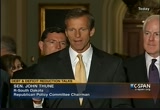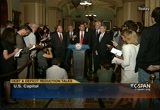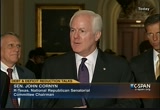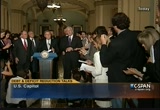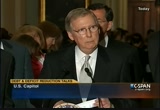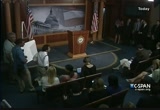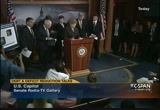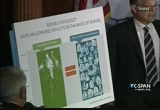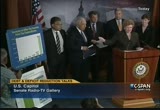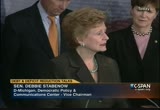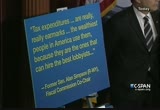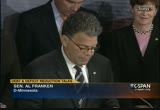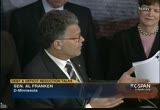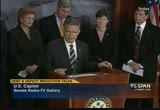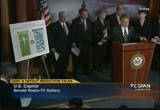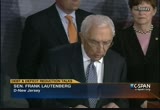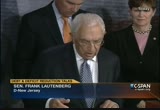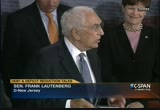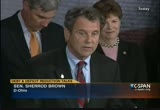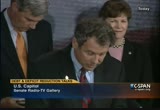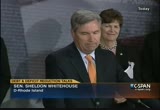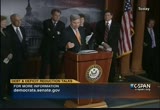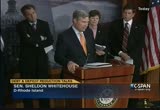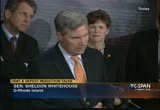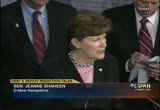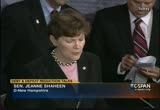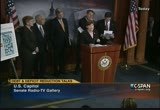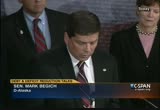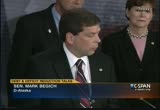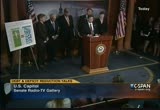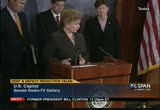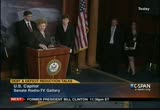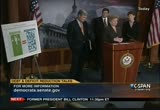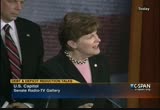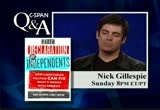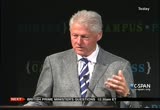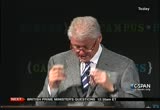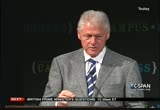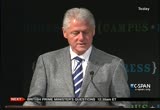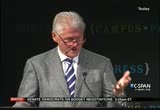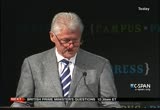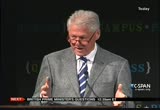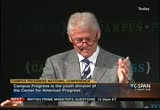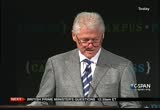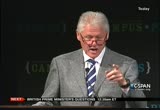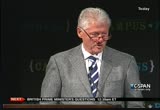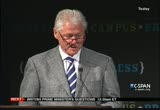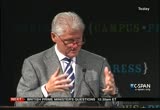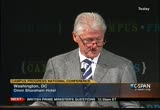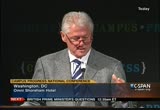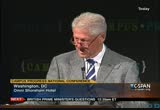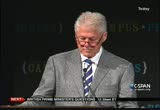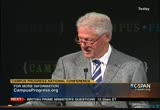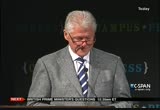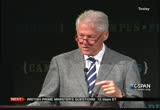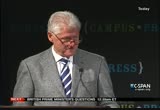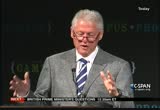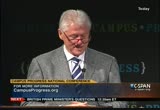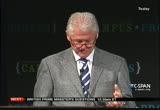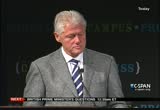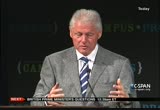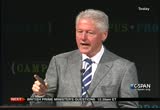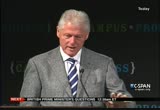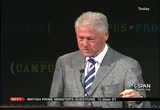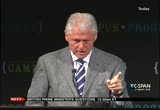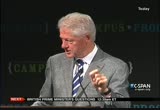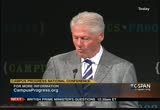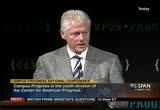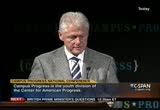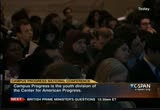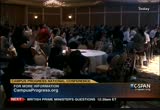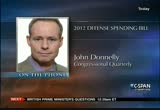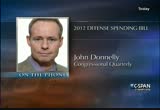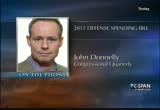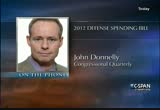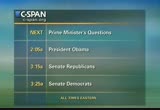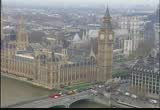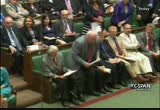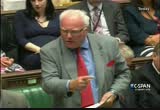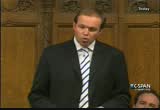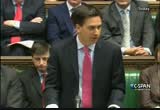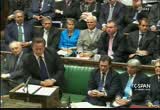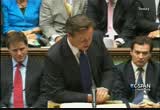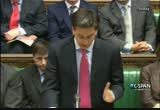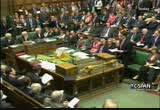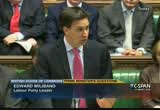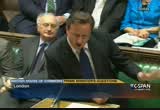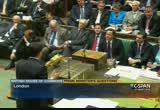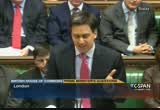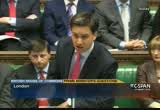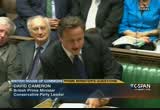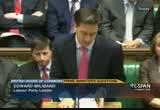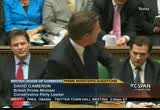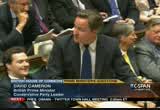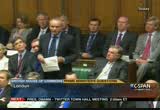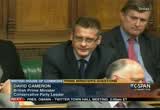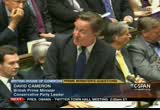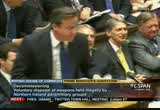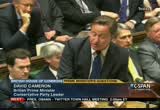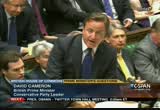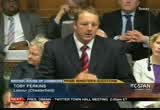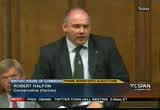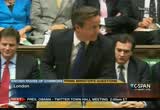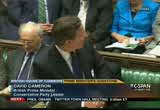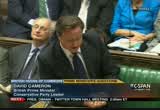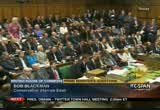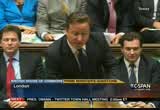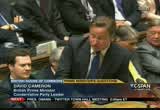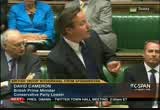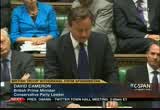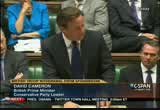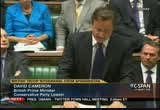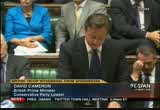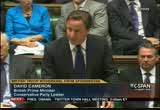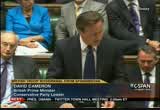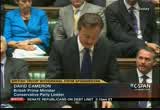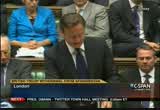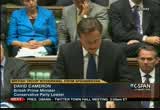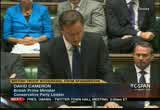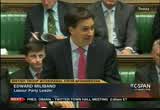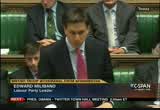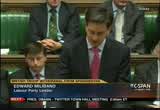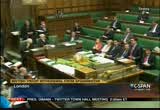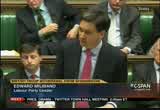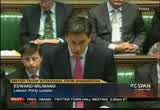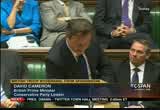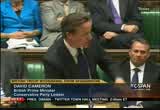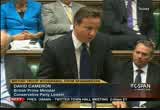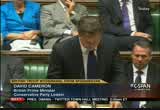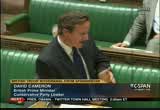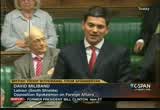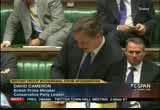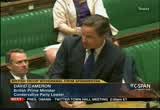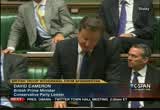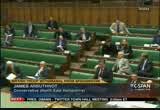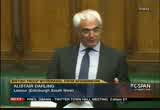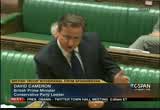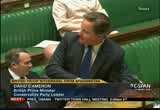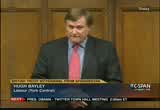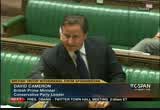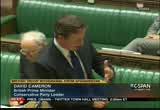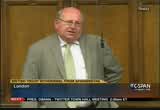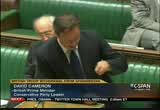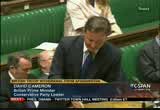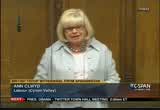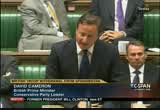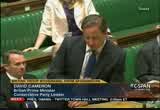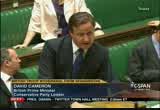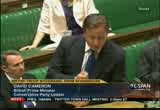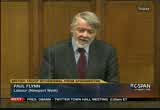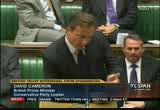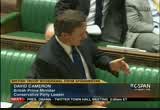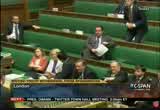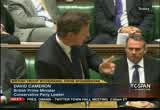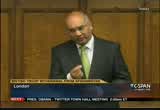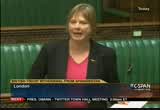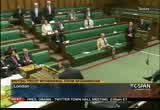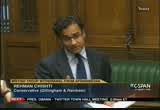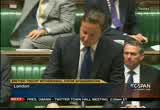tv Capital News Today CSPAN July 6, 2011 11:00pm-2:00am EDT
11:00 pm
approach is so wrong for this economy. the real issue here is the economy and getting people back to work. we ought to be thinking about what is good for the economy. that is to get spending under control, starting to rain in federal spending, and to keep taxes low on american jobs owners. >> we have 9.1% unemployment in this country. there are millions of americans who are looking for work and cannot find someone to employ them. i think the policies for this administration are making it worse and raising taxes would make it worse. the president talked about wanting to make a serious discussion. last week, he was in iowa, talking about american manufacturing. the next day he held a press conference. six times, he talked about taxing the same airplanes. how much does it matter? how much is good to be raised?
11:01 pm
for every $100 this president has added into the deficit this year, that airplane tax is only going to save 2 cents. 2 cents total of $100. mr. president, what about the $999? what about the other $999.99? we need a serious discussion, and we are not getting it yet. >> it seems so obvious that if you want more of something, in this case jobs, that you make it easier or not harder. raising taxes is something we think will make it harder on job critters to make jobs. but i believe that at long last the chairman of the senate budget committee, senator conrad, is going to make it a budget that was due in april earlier this year. i hope we will have a chance to
11:02 pm
look at that the first time. i also believe that half of it will do with tax increases, half with spending cuts. what we are left to wonder is whether the tax increases will allow the federal government to continue spending at its current rate, whether those tax increases would be dedicated to debt reduction. i fear that some much of what we are hearing about in terms of tax increases is to allow the spending binge to continue and washington not to change its ways. we have been told in an unequivocal way last november that the american people want washington to change and not continue the same reckless spending cuts. -- path. >> you have requested closing tax loopholes and said tax reform is too complicated to do in the window we are talking about now. in new hampshire is a little while ago, it was said he would consider the administration proposal on the polls, provided
11:03 pm
they are used to offset tax cuts now. is that something you are willing to show more flexibility on? >> we agree tax reform needs to occur again. it happened 25 years ago. lots of preferences have crept back into the code. it is time to do that again. it is, however, a complicated subject with unintended consequences. as several of my colleagues have pointed out, when you target particular industries you get fewer jobs. our biggest problem right now is the job problem. we want to tackle deficit reduction in a way that does not exacerbate unemployment. i am hoping that tax reform -- we need to do it broadly, to cherry pick items in the context of the current negotiation with the washington, which strikes me as pretty challenging.
11:04 pm
>> can you think of any way that wealthier people in the country can contribute to deficit reduction? >> everyone will have to contribute in one way or another. we looking lot like greece already. it needs to have a broad impact on every aspect of our society to get this problem under control. >> [inaudible] >> everyone agrees a big deal with the best. the president says that. i believe that. the folks behind the believe that. we still believe it is possible to have a comprehensive proposal here that in a serious way addresses this enormous debt problem we have. i have not given up hope that that may happen yet. thanks a lot. >> a group of senate democrats
11:05 pm
held their own news conference, where they reiterated their demand that any budget agreement include more tax revenues from those making more than a million dollars a year. this news conference begins with a michigan senator. this is half an hour. >> good afternoon. on april 15, the house of representatives voted to end medicare. the wanted to use that money to balance the budget. rather than using it to balance the budget, they used it for huge new giveaways to millionaires and special interests. their plan protect spending on massive tax earmarked for drug
11:06 pm
companies, oil companies, companies that outsource jobs, and well-connected special interests. let me just show you some of the differences. the house budget cuts medicare, $165 billion a year. it would have a yearly giveaway to millionaires of $131 billion. what does that mean to the average person? for every one millionaire who under the house plan would get an additional $200,000 in tax cuts in a year, it would take 33 senior citizens in america, each paying $6,000 extra in health care costs, to be able to pay for that one millionaire. one millionaire, 33 seniors paying double the medicare cost to be able to pay for the extra
11:07 pm
tax cut. we need to reform government, to cut what is not working, and ensure that every taxpayer dollar gets resolved -- gets results. we need to look for wasteful spending everywhere in the budget. but the republican stubbornly insist that spending and tax in remarks for special interests, or special treatment for millionaires, should not even be part of the discussion. look at some of the special deals folks are getting now. you have a millionaire under the house plan that would receive $200,000 more a year in a tax cut, and under tax spending in the tax code, earmarked in the tax code, those same folks, the top 1%, are getting over $205,000 a year in extra
11:08 pm
earnings. extra income because of special tax in marks and spending. we cannot afford these deals. the american public cannot afford special deals for all companies, millionaires, billionaires' that get the deal simply because they can afford to hire lobbyists or an army of accountants. republicans must work toward a responsible solution that does not put all the burden on the backs of seniors and middle- class families. that is why we are here, debating the issue, the resolution on the floor of the senate. frankly, seniors and middle- class families have had enough. the choice we face is very clear. republicans target seniors and the middle class while protecting special treatment for special interests of
11:09 pm
millionaires and billionaires. we say cut spending, create jobs, and and special treatment for the wealthy elite and the well-connected. a couple of quotes let me end with. alan greenspan has been talking about spending through the tax code. i think the republicans ought to identify very significant amounts of so-called tax expenditures, which are ms. classified. that our expenditures, spending. they are out late. many of them are subsidies. those are not the type of thing you want in an efficient market system. there are a lot of them. that is true. finally, let me say, quoting the code-share of the simpson commission, alan simpson -- tax expenditures are really your marks. the wealthiest people in america use them because they are the ones that can hire the best
11:10 pm
lobbyists. the whole point of the resolution on the floor is to say this kind of spending needs to be included as we focus on spending and tax fairness. we urge our republican colleagues to join with us in passing the resolution that is currently before the united states senate. senator frank index -- franken? >> if we are not doing this by seniority. i have to go to something. nobody is saying that raising revenues from the wealthiest americans is going to solve the problem on its own. and not every american -- every millionaire looks like that, so do not be mistaken. only with the right balance of cuts, careful cuts and increased revenues, can we make real progress on our long term fiscal crisis, which is real.
11:11 pm
but the very wealthy have benefited disproportionately from the tax cuts, the bush tax cuts over the past decade. at the same time, their incomes have skyrocketed. the incomes of the top 1% now account for 24% of all income. that is income, not wealth. yet the median income in america has gone down over the past decade. this is for the first time since we have been keeping records on this. that has hurt the middle class. the middle class is the primary driver of our economy. but their buying power has weakened in many ways, not just because the median income has gone down, but because health- care costs have gone up, because of energy costs and education costs. the middle class is not an end
11:12 pm
in and of itself for us. the middle class creates a strong economy. that is what we saw in the 50's, the 60's, and the 70's. in the 80's, which started to see the tax cuts for the highest income americans, and the deficit tripled during the 80's under presidents reagan and bush. strengthening the middle-class is very important. we had this discussion before. we saw what happened. in 1993, president clinton did a deficit reduction package that included raising two top rates, the top rate of those over $250,000 to 39.6%. every republican voted against
11:13 pm
it and said what they are saying today, that it would cause a recession and kill jobs. you know what happened. we had the largest expansion in the history of this country, over 22 million new net jobs. we handed off to president bush a record surplus. he cut taxes. he cut taxes, and look where we are now. he inherited a record surplus. alan greenspan said we were in danger of having too much money, the federal government. we had a $5 trillion surplus going into the future. the budget would have balanced this year. where are the jobs from these bush tax cuts? the reason there are $3 trillion sitting on the sidelines is that the middle class cannot buy. it is not because -- if you are
11:14 pm
a billionaire, you can only buy so many cars, so many planes. it is the middle-class that really believes our economy. we have to be thinking of them. thank you. >> center -- se --nator laughtenburg? >> i approach this from a standpoint of personal experience that tells me that we are not doing the right thing in our country, that those of us who are fortunate enough to have succeeded financially, whether through inheritance or hard work -- the fact of the matter is that we are living pretty high on the hog here. when i look at the kind of sacrifices that are being suggested -- these are not sacrifices. if the family has a million-
11:15 pm
dollar income or more, we are saying let them share. let them take up part of their responsibility to get this nation back out of the whole we are in. i am reminded from personal experience that there was a time in america when we said to corporations "you have to pay more on the excess profits you are making." we are saying that those who are fortunate enough to have the high incomes can do something that strengthens our country. we had the greatest generation when we said people could pick up their share of the load. there is no reason we should not now be preparing ourselves for the next great generation. we have to dig ourselves out of a whole. we desperately need help. we cannot ask those who can barely get by because their expenses far exceed the income
11:16 pm
they have. so we are saying what do we want from middle-class people? do we want them not to permit their kids to take an education, not to have their family get proper health care, not to have a job, and to have no human infrastructure to support what built america to the point that it was after the biggest calamity this country ever had, the second world war? there is a moment in time when we say pay up. stop this millionaire protection ring that is operating right now. stop giving favors to those who do not need any help. look at the people who built this society, who we need at work each and every day. pay up. do not let the fat cats sit there purring nicely away while they watch events unfold. it is not fair. it is not proper.
11:17 pm
we cannot rebuild a society that desperately needs help without saying that those who have the income pick up your share. tell those on the other side that the republicans, who for some reason or another think that millionaires need protection -- we do not think so. our country needs protection. the way to do it is to make sure that those who profited most pay a larger share of that which we need to help us. >> thank you. senator brown. >> i like that fat cats pouring. -- purring. >> the biggest problem we have is a decline of the middle class. corporation set on record profits. middle-class wages are stagnant. in many cases, anxious workers are seeing their hours cut. there is a widening wage gap for
11:18 pm
families that have seen their income declined by more than $2,500 over the last decade. corporate ceos, joined by 1% of the nation's top earners, take home more than 20% of all income. the republicans are asking middle-class and working families to absorber most of the pain in this budget. if they were serious about the budget deficit, they would and special tax breaks for wall street hedge funds. if there were serious, they would repeal special tax breaks for oil companies. if there were serious about the deficit, they would ask the wealthiest 1% to pay the same taxes they did during the clinton years, when 21 million private-sector net jobs increased, leaving us with the biggest budget surplus in american history. it is always about jobs. the focus of our resolution, the
11:19 pm
focus of what we want to do in our budget, is always on jobs. the republicans would rather protect millionaires and billionaires. they would rather have wasteful spending and subsidies to interest groups that senator simpson called air marks, and would rather protect those millionaires and billionaires than provide programs for our children to go to college. republicans have a choice. they can work with the president and later read to balance the budget and maintain america's credit rating. or they can protect their benefactors. they simply cannot do both. >> i want to illustrate the point we are trying to make with a tale of two buildings. one building is called a bond house. -- ugland house. it is located in the cayman islands. it is nondescript. but if you have watched ted
11:20 pm
conrad in action, you have seen a picture of it, because he uses it all the time. it claims to be the place where 18,000 corporations are doing business. all you have to do is look at the building to know they are not doing business out of there. the business that is being done there is not under the tax code. what they do it in an austerity -- nothing. but the good times roll is their message. what is the second building? it is the helmsley building in new york. you remember leona helmsley, famous for saying taxes are for the little people to pay. this building is big enough that it has its own zip code, which means it is big enough that you can conclude what taxes are paid out of the building because the irs quantifies taxes by zip
11:21 pm
code. the occupants were very successful and very well compensated, god bless them. they actually paid 14.7% of their federal taxes. the doorman, the janitor, the security guard all paid tax rates well up into the 20%. it is not just something strange about the ghost of leona helmsley. this is true if you look at the statistics the irs itself discloses for the 400 highest income earners in the country. they turned over a quarter of a billion dollars on average, each. they all paid tax rates that i would submit are lower than the tax rates that everyone of you paid in this room. they paid 18.2%.
11:22 pm
to get to 18.2% on our tax code as a single filer, you have to make $40,000. that is what a truck driver makes in rhode island. that is the exact same tax rate, the truck driver and the person who made over a quarter of a billion dollars in a single year. what do the republicans do about that? nothing. let the good times roll. who do they go after? they go after medicare. this program that has been the foundation of the middle class, that has not only kept seniors in peace and security and comfort, but has kept their families in the security of knowing their physical world is not going to come crashing down when there is news that mom or dad has a terrible illness and suddenly all of their resources will have to be dedicated to taking care of them.
11:23 pm
that is what the republicans have tried to take down, to protect the good times at the helmsley building and that ugland house. senator sheen. >> thank you. the debate we are having here in washington about our budget is about the priorities of this country. what kind of a country are we going to have in the country? are we going to continue to protect big corporations with special tax breaks and tax loopholes for the wealthiest? or are we going to make sure there is a level playing field for everybody? as i was thinking about this debate, a thought it would be instructive to go back to the national commission on fiscal responsibility and reform. this was issued back in december. it is also called the president's deficit reduction
11:24 pm
commission report. i thought about what is in this report. remember there were a number of senate colleagues who served on the commission report. three of our republican colleagues were on the commission. senator gregg, former senior senator from new hampshire, my colleague, and senator cockburn endorsed what the commission said about spending and about revenue. i do not think any of them could be considered to be less than tough on deficit-reduction this is what we need to do to get back to a reasonable budget in this country. what the commission said in their preamble, and i am quoting, is that everything must be on the table and washington
11:25 pm
must lead, and the national interests, not special interests, must prevail. in looking at the need for tax reform, the commission said, and i am quoting, washington has riddled the system with countless tax expenditures, which are simply spending by another name. these tax earmarked, amounting to $1.10 trillion a year of spending in the tax code, not only increase the deficit but caused tax rates to be too high, instead of promoting economic growth and competitiveness. the current code drives up health care costs and provide special treatment to special interests. they went on to say further that the reducing the deficit will require shared sacrifice, those of us who are best off will need to contribute the most. tax reform must continue to protect those who are most vulnerable, and eliminate tax
11:26 pm
loopholes that are favorable to those who need help least. i guess my question is to our colleagues on the other side of the aisle. what has changed since this report? three of the toughest republican leaders on deficit reductions agreed with this plan. they agreed to the principles i have just read. i think our republican colleagues do not really want to protect tax breaks for race horses or gold mines or big oil at the expense of investments in education, energy, or infrastructure. as democrats, we have all said, and i think most of us here have said, that we recognize we are going to have to make hard choices. we have supported spending cuts. when are our colleagues on the
11:27 pm
other side of the aisle going to recognize that to address this problem they have to raise revenue and address the kind of tax loopholes we have all talked about? >> the last person, it is easy to summarize what everyone has said. our message is clear. we see as we are dealing with the budget and talking about the debate on the debt or today's resolution on the floor that hopefully tomorrow we will vote on, we are setting the course to find a balanced approach as we deal with the budget. i just got back from alaska for three days. i have listened to the alaskans and what their issues are. they want to make sure it is fair. what we have seen so far is that the other side has said basically we are going to start with eliminating the benefits that are critical of around medicare or dealing with our children and other types of
11:28 pm
programs. from my perspective and what i hear from alaskans, this is unacceptable. we cannot ask working families to bear the burden of spending cuts while millionaires and billionaires enjoy a massive tax giveaways. i hear from alaska voters every day who were worried about feeding their children, making sure they go to work, that they can afford rent or gas to get to work. to place the burden on those families is not the answer. it is not the right thing to do. may know mistake about it. just like families across this country who have been cutting back on tough times, we all have to compromise to figure out the serious efforts to reduce the deficit. we're going to make choices, but responsible choices. that does not mean abandoning our priorities. that is why we are here all together today. we are willing to compromise, but willing to work together. we hope our colleagues will join
11:29 pm
with us. let me say, as we have talked about the issue of tax expenditures -- every tax expenditure we do, every loophole that is granted, every special interest that gets a break in the tax code, it means middle class america has to pay for it. the last time we had tax reform was in 1986. since then, we have riddled the talks could with special deals for everyone you can imagine, except the middle class. those are the ones paying these big bills, the $1.20 trillion of tax expenditures every year. we asked our colleagues on the other side to sit with us and work together to create a balanced and fair approach. we recognize spending, accountability of the budget, is critical, figuring out where we are going to cut and which programs which can no longer afford. when it comes to tax expenditures, we expect the other side to see the same
11:30 pm
thing. we have to decide what things we can no longer afford. we can no longer wait out our view that as we start this budget, some have said -- i heard today on the other side that it seemed to be a meaningless approach. to be frank, it is an important approach, sending our message of what is important in this budget. millionaires and billionaires, we can no longer afford the tax benefits they have been receiving for years and costing the middle-class. >> we would be happy to take a couple of questions. >> in order for an entitlement to be on the table, what changes to medicare and medicaid would you accept? >> our focus today is on the fact that spending cuts need to be looked at, whether it be direct spending or spending
11:31 pm
through the tax code in terms of tax earmarked. that is the focus of what is on the floor. we are cutting back on overpayments to insurance companies and focusing on increased accountability and quality measures that are going to bring down costs over time. but we are focused today on a cryptically -- critically important issue. we have seen colleagues on the other side of the i'll walk away from budget talks on the question of whether there will continue to protect billionaires' and people who get tax remarks. we want to focus on the fact that that kind of spending is not something that we can afford any more without evaluating every single one of those spending measures. >> republicans could consider
11:32 pm
some tax hikes. what is your response? >> we want to look at everything. there is no question about it. we welcome and saying they are willing to take away from special tax earmarked that have been there for years. what we clearly do not want to see is an effort that continues disproportionately to balance the budget on the back of senior citizens and working families. speaking on behalf of folks in michigan, we have had enough of that. they want to see special deals going to the wealthy elite and the well-connected being evaluated as well. >> but i think what senator kyl has said is that instead of using the revenue you would pull in by doing away with the subsidies for deficit reduction, they want to use it for rate reduction.
11:33 pm
>> let me say that in the house budget, they make a trade-off similar to what is being talked about here. that is to cut medicare, double the cost for the average senior, $6,000 more per person for health care. they want to give an additional cut to the millionaires and billionaires of this country. that is not an approach we support. if they are talking about more of the same, that would not meet our task of not balancing the budget on the back of senior citizens and the middle-class. >> we heard a couple of republicans today say we are not means testing and that will be senior citizens perhaps should have higher premiums to medicare or see cutbacks in
11:34 pm
social security benefits. >> first of all, they are going to be discussing all of this with the president and the leaders with what is a balanced approach. i think we would start off by saying that social security and medicare are great american success stories. we support making sure they continue for the future. social security has brought a generation of seniors out of poverty to be able to live in dignity in their homes. medicare has love folks like when my mom, who is 89, to enjoy her grandchildren and live a longer life because of the great american success story called medicare. we start from that premise. they start from the premise of wanting to eliminate medicare. we start from the premise of wanting to maintain medicare. we will see what it is they develop in terms of the negotiation. >> you just said that on the one hand you do not want millionaires -- you do not want
11:35 pm
things to be balanced on the backs of seniors. yet in the commission, the first line was everything is on the table. is everything on the table or not on the table? >> there is no question we will have to make tough decisions through direct spending. we have already done that. we support cuts, in areas where there are not parties. in a state like mine, where folks of been struggling, with houses underwater, where they are out of work, they want to stretch every dollar as far as they can go. we have had a hearing on accountability, how we evaluate everything, measure for performance and accountability. that is what we want to do. but everything on the table means that spending through special tax earmarked for the planes and trains and
11:36 pm
automobiles -- even automobiles, we have to put on the table. the reality is that those who are the wealthiest among us and the most well-connected, who receive special tax earmarked through spending and the tax code, need to know that will be about a weighted in as tough a manner -- >> we as democrats have put spending cuts on the table. we not only put them on the table. we voted for them. we passed $38 billion in spending cuts. i want to know when my colleagues on the other side of the aisle are going to be able to support closing those loopholes for tax expenditures. that is what we have not heard from the other side of the aisle. all they have done is dropping line in the sand. you cannot get there from here.
11:37 pm
everything has to be looked at. they have said we are not going to look at tax expenditures like loopholes for people with yachts and racehorses, and subsidies for oil companies. that needs to be on the table. >> thank you very much. we are going to get ahead of you. that was a great one. you. [captioning performed by national captioning institute] [captions copyright national cable satellite corp. 2011] >> who is really going to get fired up for nancy pelosi or john boehner? dick are shorthand for the incredibly narrow range of choice we actually have been elected officials. >> in the declaration of independents, nick gillespie takes on the problems of the
11:38 pm
two-party system and possible libertarian solutions. >> mission control houston. >> roger, discovery. >> mass that is on -- nasa is on schedule for the final mission of the special program. look back, starting with the launch of columbia 30 years ago, and explore what is ahead for nasa. online at the c-span video library. watch and share any time. former president bill clinton spoke today at the annual campus progress conference in washington. he talked about the federal deficit and debt talks. this is 50 minutes. >> thank you. [applause] thank you very much.
11:39 pm
first a lot to think emily for the wonderful introduction -- i want to think emily for the wonderful introduction and for sticking up for progressive causes in our native state, which probably went further from democrat to republican in the 2010 election than any other state in america. i am grateful for her commitment. i want to thank the wonderful head of the center for american progress, my former chief of staff, and the director of campus progress, who was a very able speechwriter for me on foreign policy when i was president. a sort of have to show up when they ask. [laughter] but i am very glad to be here. i want to begin with something that was emphasized in the brief film. most of the time when i was in politics, people debated what
11:40 pm
are you going to do and how much money are you going to spend on it. there was not enough attention given to how are you going to do it so your good intentions actually turn into real changes. and if you do not think about that, you get in trouble. for example, and i will come back to this in a minute, but i just want to mention it -- in the current budget debate, there is this discussion about how much will come from spending cuts, how much will come from tax increases. almost nobody is talking about one of the central points that everyone who has analyzed this situation makes, including the bipartisan simpson-bowles commission, which said you should not do any of this until the economy is clearly recovering, because if you do things that dampen economic growth, and the u.k. is finding
11:41 pm
this out now -- they adopted this big austerity budget. and there is a good chance that economic activity will go down so much that tax revenues will be reduced even more than spending is cut, and their deficit will increase. so why aren't we talking more about the economy and less about this? partly because the republicans who control the house and have a lot of votes in the senate have now decided that having quadrupled the debt in the 12 years before i took office and double that after i left, that the deficit is now the biggest problem in the world. i will come back to that. but i want you to think about it. i hate these deficits. i was appalled that the debt was doubled almost eight years after i left office. i think the fiscal condition of the country did make us weaker in dealing with the financial crash.
11:42 pm
i will say more about that in a minute. but you have to know what works. there is almost no discussion in this debate. i read the articles every day. the timing of whatever it is they do and whether it will work or not, no discussion. when i left the white house and started this foundation a decade ago, i decided to focus on that. i wanted to work on things i had cared about when i was president, where i could still have an impact. it seemed to me that i was in a position to try to involve people in answering these how questions. for example, the first thing i did was establish at the university of arkansas, at my presidential library, a graduate school which would offer
11:43 pm
americans first degree not in public policy but in public service. students there spend half their time in the field, in america and all over the world, trying to actually figure out how to solve a particular problem or seize a particular opportunity. then i got involved in this aids work, because when i left office there was a relatively small amount of money being spent in the global fight against aids. the united states, the last budget i left was for $300 million a year. that was 25% of everything being spent in the world. but we organized the global fund on malaria. then president bush came in and passed a program that was his finest achievement, which allocated billions of dollars to
11:44 pm
the fight against aids, and later malaria. anyway, we did not have a lot of money. when i started, there were only 200,000 people in poor countries getting medicine necessary to live, something we had come to take for granted in america. 2/3 of those people were in brazil, a rising economy where the government paid for medicine and they have pharmaceutical companies. we were playing and to pay $10,000 a year for standard aids treatment to keep people alive. that is the medicine that is given out at my neighborhood clinic in harlem. the generic medicine was about $500 a year. it sounds cheap, but in countries with a per-capita income of less than $1 a day and an infection rate of 10% or higher, it was prohibitively
11:45 pm
expensive. so basically when i looked at it, and i got some people to help me, the aids medicine business -- i want you to think about this with you think about the things we are concerned about today. even at $500 per person per year, it was a high profit margin, low-volume, uncertain payment business. so i went to canada, ireland, and a number of other donors and said, "i want you to promise to fund these programs. i do not want to to give me the money. i just want you to give me the right to greenlight the money if i can get a lot of medicine discounted." then we went to the producers of the medicine and said, "we want you to change your business models from a low volume to a high volume, from a high margin to a low-margin, from an uncertain payment to a certain payment business.
11:46 pm
we will help you with manufacturing and supply chain and give you money promptly. how much can resell the medicine for?" we cut it to $140. [applause] then the children's medicine we cut from $600 a to $190. then when we got serious money in there, we cut the price down to -- the old regime, which some people still use, we can buy for $90 now, and the children's medicine for $60. there is one pill that is easier to use which we now have down under $200 from about $700. the point i want to make is this was not a republican or democrat to deal. there was a certain amount of money. there was a certain amount of people who needed the medicine to stay alive. we are not where we need to be
11:47 pm
yet, but now in 70 countries there are 4 million people, about half all the people in poor countries, which is a long way from 200,000, he getting medicine off of these contracts, including 75% of the children. the money made a big difference. one was funded primarily by the french airline tax on overseas flights. that funds the children's medicine part. i give you this only as an example. we applied the same theory to try to lower the cost of new technologies when we got in the climate change business. we are helping 40 cities around the world to try to reduce greenhouse gas emissions by not only retrofitting buildings but changing the street lights. wherever possible in megacities, we close landfills, which are huge in matters of methane gas,
11:48 pm
and which are gold mines. in all those landfills, you have recyclable glass, plastic, and metal, and all the rest. the organic material can be turned into fertilizer and the rest can be turned into electricity. we are trying to do the same thing. we have doubled, tripled, and sometimes quadruple the income of african farmers by lowering the cost of fertilizer and seed, and working out a distribution network, and saving them have their income by taking their products to market. the point is i live in a world now which is very different from the world and found in washington, which was three different than the world a live- in when i was a governor. -- ban the world i lived in when i was a governor. i had a young man working for me in the white house. he had been with me for 10 years when i was governor.
11:49 pm
i mentioned something in the paper that was highly critical of me, and i asked this guy if you read it. i asked what he thought of it. he said, "they are talking about somebody i am not familiar with." the problem with the national political environment is it is so far removed from real people physically. and all the players are trying to get their bit on the evening news, there headline. you tend to lose what really matters, which is how this is going to affect us. it is your future, and people all around the world. so i think first i want to say whether you like or dislike what is going on in the government, it is really important that you spend a lot of your time and
11:50 pm
attention trying to change the reality on the ground within one other constraints public -- whatever constraints public policy imposes. at the opening of the u.n. every year, we bring in philanthropists and government leaders and ngos. we fly people in from the poorest countries in the world who are active on the ground, doing things, who do love to have money. we all get together and instead of giving speeches everybody has a conversation and makes a commitment. in the last six years, those commitments have already measurably improve the lives of 300 million people in 180 countries, just by asking people to do it. we have university students every year. the university students, as you know, do not have a lot of money. [laughter] but very often they have the best ideas. last year, to students at maria college -- anybody here from the
11:51 pm
college? it was established before the city -- the civil war in kentucky, 1855, the university then open to women, which was a radical idea at the time, and also available to african americans. the have very low tuition. all the students work on campus. two students decided they would go out into their neighborhood in eastern kentucky, which is hilly and part of appalachia, and to free energy audits. -- do free energy audits. they are doing it. we found out they can actually save these poor people a lot of money for almost no investment. another student at the university of california in san diego realized there were huge numbers of students who were not even aware of all of the tax
11:52 pm
credits they were entitled to. some of which were passed when i was president. [laughter] he calculated that if there was 100% knowledge -- we will come back to this in a minute. if there was 100% knowledge of all the students at the university of california in san diego of every form of student aid they could access, they would save $2.50 million a year just on that campus. so i believe in all of this. and i think you have to have -- you cannot get discouraged when the politics are going in a direction you do not like. you have to keep fighting against the things to do not like, but also find something to do that you do like. it is very important in life not just to be against a tide you oppose, but also to make
11:53 pm
something good happened. every time you make something good happen, it gives weightier position on these political issues. -- wait to your position on these political issues. one of the most important bills i ever signed created americorps. [applause] these people made a big difference. that brings me down to this current moment, and your topic. this is a neat twist on the old speak truth to power. turning truth to power. you cannot turn truth into power unless you have it in the first place. that begins with basic facts. for example, we have this
11:54 pm
current political drama playing out in washington over the budget. what do you want america to look like in the 21st century, anyway? the decisions you make on the budget should be informed by the life you want to live. when you are 30, when you are 40, when you are 50, what do you want america to be like? when you have children in these chairs, what do you want it to be like? president obama has a vision of an economy that works for everybody, that is modern and sustainable and offers shared opportunities, a vision of government and society that involves shared responsibilities, not specific benefits nearly as much as
11:55 pm
everybody pitching in and doing what they are supposed to do to create the government we need to have for a structure of opportunity and empowerment to take hold in america. and he has a vision of a community that makes the most of america's greatest asset, our diversity. that is why he and i passionately believe in the dream act. [applause] i do not understand -- [applause] i think we are better off with more immigrants, not fewer, so i do not understand all that. [applause] the main thing i want to say is -- it is why he believes in gay- rights. [applause] i was immensely proud of another of my former administration members, now the governor of new york, passing the gay marriage
11:56 pm
bill there, just because -- [applause] if you look at the story of america, we had a lot of speeches on the fourth of july about what america means and what the intent of the framers was, and all that. the declaration of independence gave america a permanent mission. the framers pledged their lives, their fortunes, their sacred honor to form a more perfect union. that is 18th-century speech. in 21st century slang, that means we are not perfect and are never going to be perfect, but we can always do better. our job is to keep stumbling in the right direction. or in the words of martin luther king, the ark of history is
11:57 pm
long, but it bends toward justice. our job is to make sure it bends in the right direction. as president, i used to tell people that to me forming a more perfect union means widening the circle of opportunity, deepening the meaning of freedom, and strengthening the bonds of community. and it requires all of us to keep growing and learning and embracing. several years ago, a man named robert wright wrote a book that had a big influence on me. he also wrote a book called "the moral animal," and he met socially ethical, that people wanted to be cooperative and needed to work together. "non-zero" the central argument is that ever since the first people rose on the african
11:58 pm
savanna 150,000 years ago, there has been a constant need to redefine who is us and who is them. and the definition of us has gotten bigger and bigger. that is the only thing that has kept humanity from destroying itself. and the only way you can make a bigger definition of us is to have competition and cooperation and a way that coming in game theory terms, allows non-0 some games. a zero sum game is what americans love. there has to be a winner and loser. i love march madness every year. i love the big east basketball tournament. a couple years ago, 2 of our teams played six overtimes. there were so exhausted they were not very competitive in the n.c.a.a..
11:59 pm
but we insisted they play until they drop. in my native state, the university of arkansas was involved with ky few years ago in a football game that went to six overtimes. the score was 71-63, and sounded like basketball. that is not a good model for the way society has to work. we have to find a way to have enough competition to keep creativity alive, but we do not require their to be a lot of losers. what does that mean for where we are now? in contrast to the vision the president has laid out of shared prosperity and shared responsibilities, and a deeply widening community, the current governing philosophy of the
12:00 am
republicans in congress is that america would be justified -- would be just fine if we could weaken the government more. the government is the source of all our problems. there is no such thing as a good tax or a bad tax cut, no such thing as a good regulation or a bad the regulation. and all these programs are a waste of money and time, beginning with the stimulus. this idea that the government is that the government is the source of all of america's problems would strike the founding fathers as something strange. but it has had a great hold on america since the election in 1980. let's look at this. let's take a walk down memory lane and realize you cannot turn
12:01 am
truth to power unless people know. let's begin with something recent. in the 2010 election, the democrats took a terrible whippping. we were always going to lose in a row seats. first, people only hired the democrats in the last 30 years when things are messed up. [laughter] so they hired me in 1992. [laughter] and then they hired president obama in 2008. so they want us to fix them. in 1994 and 2010, things did not feel fixed. it is hard to fix things that were messed up over a longer time. but people did not feel fixed and we had a lot of what you
12:02 am
might call soft seeds, seats we had picked up because of bad economic conditions in 2007 and 2008. but the election results were more adverse to democrats i believe if voters had known basic facts. before we blame them, those of us who did know, we have to blame ourselves. the american people make rational decisions based on what they know. if they do not know, you cannot turn truth and power is the ultimate holders of power, the citizens themselves, do not know the facts. for example, everybody knows the stimulus was a failure, except it was not.
12:03 am
the hole blown into the economy was about $3 trillion deep. the stimulus was $800 billion. even albert einstein could not fill a $3 trillion whole with $800 billion. second, the stimulus was designed put a floor in that hole. and it worked. 36% of the stimulus money went to a tax cut for 95% of the american people. most americans voted on election day not knowing that they had received that tax cut. why? because it was given out the most economically effective way by cutting the payroll tax. and the republicans did not consider it a tax cut because the top 5% did not get theirs. [laughter] i want you to laugh, but it is serious. [laughter] the most important thing in the world for me, as someone who now makes money that i never dreamed
12:04 am
i would make is that i got my tax cuts under president bush. i made out like a bandit. i should've changed parties. [laughter] but it did not seem to me to work. but the american people did not know that. they did not know that another 30% of the money went to state and local governments to keep them from having to lay off 1 million teachers and police officers and health care workers. now that the stimulus has played out, you may be interested to know since the economy is not fully recovered, but one of the things that keeps employment high is declining payrolls at the state and local government level. it will have, among other things, quite adverse impact on our schools. only about a third of the money , even less, was spent to create jobs.
12:05 am
a lot of it in green energy and manufacturing. then there was the automobile restructuring, which was not a bailout it was aid in return for restructuring. let's look at what happened that people did not know. as of last november, america's automobile industry was coming back and we had 70,000 more people working in the automobile industry. if the hell with -- if they have all been allowed to fail, it would of affected dealerships and all those things. more important, listen to this, when barack obama took office as president, the united states had exactly 2% of the market for these high-powered batteries that are necessary to run highbred-electric and oil- electric cars. because the congress had previously provided a tax
12:06 am
credit in 2007, for new green manufacturing jobs and then it was turned into for start-ups in 2009, the cash equivalent of a startup -- you did not need a tax credit. they wanted to accelerate the growth of the new manufacturing. so then you can get the cash. on election day, america had 20% of the world market. from 2% to 20% in less than two years, with 30 new factories built or under construction. 18 of them were in michigan, the highest unemployment rate in the country. but it was a secret to most voters. if you knew it and you did not
12:07 am
tell people, you were part of the problem. would it have reversed the aggregate results? no. but let's go to something that everybody said -- the tea party says that they hated the bailout. they said it was a waste of government money. there is due reason that john mccain and barack obama both voted for the bailout, which was widely unpopular and they did not want to do it. it is not because of wall street, but because of main street, the biggest car dealership in the country had stopped financing cars and you could not go to sears and buy any kind of appliance on credit. the financial system had to be saved. but we did not want to go there again. so most people did not know this they said we hate these bailouts.
12:08 am
the democrats pass the financial reform bill to stop excessive leverage, to stop companies from making too many investments that they did not have the cash to cover. traditional banks could own $10 for every dollar in cash they had. when bear stearns failed, it was leverage that 34-1. lehman brothers, about 30-1. now the government can stop that and they have been instructed to stop that. and, by the way, if somehow they get around us and fail again, there is no bailout so the shareholders have to eat the loss. in other words, the democrats to pass the bill that was designed to prevent future meltdowns and future bailouts and people were going into the against them
12:09 am
thinking that they would the bailout party. then they cut medicare. remember that one? the republicans ran to the left of medicare until i went in. they want to reduce the amount of increase given to certain medicare services, particularly the medicare advantage program, which is a company-managed program -- and use the money to close the doughnut on the senior citizens drug program and add years to life of the medicare trust fund. but nobody knew it. one of the most important bills the president signed and supporters and that arne duncan supported was a bill that radically reformed the student loan program. by making a national system out of what i was able only to make voluntary for schools when i was
12:10 am
president and then the bush administration did not like it so nothing happened to it. the student loan program used to work like this. students would qualify for loans and get loans from banks. the government would guarantee 90% of the loan. the new program was like this. the government sets aside a reserve and loans the money direct to the schools and to the students so that the interest rates are lower first. secondly, every student in america will now have the option of repaying their student loan as a small fixed percentage of their income for up to 20 years. this is huge. this means nobody ever has to drop out of college again because of the cost. nobody ever has to be afraid to take out another loan. and when you get out of school, if you want to take a couple of
12:11 am
years to do a public service- related job -- if you want to be a teacher or do some kind of community service -- your loan obligation will be determined by your job, not the other way around. this is a massive thing. and, to boot, it saved $60 billion in government subsidies to banks, $40 billion of which are put into guarantee the next decade and keeping up with inflation. the other $30 billion reduces the deficit by $20 billion. the republicans propose to repeal that. they were really honest about it. bank reforms are moneybags. but at a time when america have already in the last decade, since the first time since world war two had dropped the percentage of young adults with four-year college degrees, a clematis development, even
12:12 am
though we were first in the percentage of young people going to college, what does that tell you about the impact of cost? they actually had people in congress saying hey, both for us. who will make student loans more expensive and increase the deficit. [laughter] why? because nobody knows. you cannot translate knowledge into power if nobody knows. i remember, in the election, all of the things said about the health care reform. they call the obamacare. they said it was terrible. it would cost employers to drop coverage, even though most private employers would be better off under this law and small businesses get substantial subsidies to offer coverage. in 2010, in the election, the
12:13 am
insurance companies raised the private insurance companies premiums through the roof. they hate -- they said they hated to do this, so sorry. but this obamacare is so uncertain and we have to build up a big reserve. and no one pointed out, even though it came out at the end of the elite -- at the end of the election when they brought out the numbers -- when the recession was in its death. what happened in 2009? the for-profit health insurance companies profits increased in that horrible year by 26%. they raise rates through the roof, causing 5 million americans under the old system to lose their health care, 3 million of whom went on the state medicaid program which ballooned both the federal and state governments. but nobody knew.
12:14 am
you cannot turn truth into power if you do not have the facts. and people do not connect the dots. i did not think that health care reform bill -- bipartisan vote has cleaned up some of the requirements. but there was such a passionate desire to repeal the 1100-page bill and that is because of one line that said, from now on, if you are on a big insurance company plan, 85 s. is a fine sense of your dollar has to go to coverage and not to -- 85 sense of each of your dollars have to go to coverage and not to marketing. i saw a small article in the paper that said that america's largest insurance company and one of its best, aetna, had
12:15 am
filed a petition in connecticut with the commissioner of insurance to lower health insurance rates 10% across the board because of the 85% requirement. in other words, it will work and still nobody knows this. so we spend too much time majoring in the minors. i want you to serve. i want you to enter the house questions. i want you to lobby for the things that you clap for, like the dream that. but this economy is fragile. we cannot go another decade with falling the number of young people in college degrees. and people have to know about it. you have to know. here's what i want to say about this whole budget debate and the government would mess up its two car parade and all taxes are bad.
12:16 am
there's not a single example today of a really successful will the country that does not have both a vibrant economy and a strong effective government. not one. not anywhere. this political and economic theory -- i saw one economics college freight space. it says that the economy is irrelevant. it must be wrong. [laughter] [applause] let's look at the evidence. in 1980, we embraced this theory. the government would mess up the two car rate. president reagan was great. he could make you laugh and he was also more ecological -- more
12:17 am
ideological and rhetorically impressive. otherwise, the debt would have been even bigger. he signed bills restoring 40% of the money that was given out in tax cuts in 1981. but we began to do something we had never done before in this country. we began to run large structural deficits in good times and bad. and you can say, oh, well, president reagan had a democratic congress. that is true. and there were democrats who voted for the tax cuts. but it is also true that the congress actually appropriated a slightly less money than the administration asked for in those eight years. it worked pretty well to generate a lot of jobs. in the beginning. it was unlike president obama's problem. it was 8-year-long stimulus.
12:18 am
but it started to play out. then it produced almost no new jobs. and president bush's term, which is how i got elected. [laughter] i do not mean that funny. i like, ed meyer, and love him. he is a good man. when he said it was voo doo economics in 1989, he was right. and he had to pay the price. you cannot run a structural deficit without paying the price. i could come in and begin to balance the budget right away and cut that deficit because i knew it would lower interest rates and investment would pick up and we would be off to the races. then i left office -- one of the things that was really helpful in this was the rule called pay- as-you-go. if you want to start a new program coming up to stop something you're doing or come
12:19 am
up with the money to pay for it. after i left office, a lot of these same people who do not want to raise the deficit now, what is the first thing they did? they let the pay-as-you-bill will expire and they voted for eight years to raise the debt ceiling and double the debt of the country. so how is it working? 12 years before and eight years after the time i served -- how is it working? ward jobs in those eight years than in the 20 years combined, -- more jobs in those eight years than in the 20 years combined. business formation -- every other indicator -- and the only course surpluses we have had since 1969 and the for some had four in a row in more than 70 years. this is not about whether you are fiscally conservative or not. this is about what works.
12:20 am
this theory will not work. that is why the president has been resisting it. from world war two to 1980, constantly, the bottom 90% of us took home 65% of national income. the top 10% of us took home 35%. 1%. top 9% got 9 look how it has changed since 1980 under the alternative theory. the bottom 90% share of national income has dropped from 65% to 52%. the top 10% has gone from 35% to 48%. the top 1% has gone to 32%. that happened for two reasons. one is that the government is the problem. the other is something
12:21 am
happened outside of government. i am so old i cannot believe it. i get my medicare card this year. [laughter] i am about the last generation of people who could have gotten an mba. when i was in law school and if i had been in business school, we're taught that corporations were creations of the state and that, in return for their privileges, they have certain responsibilities and they have responsibilities for their stake holders, other employees, customers, and the communities that they were apart. for 30 years,, with the problem is the government theory, we have been told that the responsibility was to their shareholders. those ideas together have produced a combustible and unsustainable situation in
12:22 am
america. if you want to be in a situation where no class kids and people like you have a shot at the american dream, we have to reexamine the votes. professor michael porter of harvard business school is a distinguished republican who i have known for many years. he has done great work in development in the inner cities. he has a cover story saying that we have to change our notions corporations' biggest to shareholder values to corporations exist for shared values. there has to be a mission that involves sharing, and other non- zero sum game. that is what i want to say. it is not true that government will mess up a few incorporate. i will give you this other
12:23 am
example. medicare is the biggest driver of the federal deficit. medicare and medicaid. but that is because health care costs tripled in the past 12 years from 1981 to 1993. we kept them more and less in line with inflation and then they tripled again. in that context, here's the problem with just cutting medicare. medicare is a better value than the rest of health care. since 1970, medicare costs for a recipient has gone up 400% from private insurance premiums have gone of 700%. the health care system is not competitive. we spend 17.2% of our income on health care. no other wealthy countries spend more than 10.5%. that is canada. everybody spends between 7% and
12:24 am
9.5%. it is because of the way we administer it through our health insurance system, which means that 30 cents on the dollar goes to paperwork. that is $200 billion plus a year. is money that could go on green technology and paying down the debt. we cannot continue this. i will just give you an example of why the government has to play a role in this and how medicare costs can be brought in line with inflation only if health care costs are. we have known now for a few years that thousands of people die every year at the cost of tens of billions of dollars from hospital-acquired infections. and many thousands of others have to come back to the hospital to get fixed again. and the primary purpose -- the
12:25 am
primary cause of this is the lack of adequate, rigorous sterilization procedures at every step along the hospital stay. a white house fellow under me and literally a brain surgeon -- he has written a book on this called "checklist manifesto." he points out that, if you put a nurse in charge of the doctors and everybody else, it is four or five critical junctures through the journey in a hospital. you can take this infection, the death rate, and the tens of billions of dollars out of the system. guess which hospital network was the first in america to rigorously implemented. the va hospital. that is not true. that is a government system. i say this to encourage your
12:26 am
activism but to say your activism has to include sharing what you know with your generation. i cannot help thinking, since we just celebrated the fourth of july and we're supposed to be a country dedicated to liberty, that one of the most pervasive political movement going on outside of washington today is the discipline, passionate, determined efforts of republican governors and legislators to keep most of you from voting next time. there has never been in my lifetime, since we got rid of the poll tax and all of the other jim-crow burdens on voting, the determined effort to limit the franchise that we see today. getting rid of same-day
12:27 am
registration. some states are getting away -- getting rid of all of advance voting print the state of florida signs a bill that give people the right to vote when they got out of prison and they finished their probation, even if they did not have a pardon. why should we disenfranchise people forever once they pay their price? because most of them in florida were african-americans and hispanics and they tended to vote for democrats. that is why. why do you want to get same-day registration? why has new hampshire made it almost impossible for college students who live in other states and live in new hampshire's most of the year to go there? why is all of this going on? this is not rocket science. they are trying to make the 2012 electorate look more like the 2008 in electric than the 2
12:28 am
electorate. we need to widen the circle of opportunity. it sounds good. but if you lose your right to vote, it does not amount to much. are you fighting it? you should be fighting it. i think there's a good chance that the new hampshire deal is unconstitutional. there was a case in the 1970's that gave the students the constitutional right to vote where they reside most of the year. but the larger point want to make is this. most of my life has nothing to do with any of this. my life is my foundation and the global initiative and try to get people involved in doing affirmative things. but, in every place that i work, and i do not go to any country unless the country welcomes our foundation, i see what a difference a government makes -- a good one or a bad one, a
12:29 am
confident 1 or 1 lacking in capacity. in our country, you have to both serve and be a good citizen. in fact, i think being a good citizen requires service, but it also requires knowledge. if you are serious about turning truth to power, remember this. it begins with knowing. it begins with a knowing. there's too much we do not know and too much we know we do not share. you cannot blame citizens for mistakes they make for what they do not know. most people do not have the time or the space, the emotional or financial or practical space that you have at this moment in your lives to know. so make sure you know and make sure you share. thank you and the luck. god bless you.
12:30 am
[applause] ♪ >> congress is in session this week, and members have been working on the federal budget. the house is in the middle of the annual defense spending bill and will continue working on it when they return at 10:00 a.m. we talked to a reporter for details on that bill. >> joining us is john donnelly from "congressional quarterly."
12:31 am
as you watch debate on the 2012 defense bill, what are some of the key votes that you are keeping your eye on? >> one of the things that is going to be interesting is to see whether there will be anything to restrict funding for the u.s. military operations in libya. during the last week of june, the house held a couple of votes, demonstrating that they do not really have support for cutting off or curtailing funding for the libyan campaign, nor do they have the votes to endorse the campaign. and so, it is going to be interesting to see whether anything can be fashioned that would be able to pass one way or the other. >> because there has been talk before the defense debate that there may be a number of amendments offered on libya. >> yes, several have been filed. the republican for oklahoma has a number of amendments that would cut off funding entirely
12:32 am
or flatly. another that would cut it off unless congress authorizes u.s. involvement in those hostilities or if the president called them, and then dennis kucinich from ohio along with a republican from michigan are working on one that i think is the likeliest to see a vote, which would basically block spending for the operation, but there really is not enough support for that, because we thought in late june that the house rejected an amendment that would have limited funding for the operation to only supporting the operation, like refueling in surveillance and reconnaissance missions. that did not succeed, but as i mentioned, neither was the house successful in passing something by hastings that would endorse the operation. >> one more quick thing about libya, the senate was supposed to begin debating the role in libya.
12:33 am
what has happened to that debate? >> the senate foreign relations committee one week ago past 14-5 irresolution from senators john kerry and john mccain that would have authorized, in essence, the libyan operations. that was to see a vote this week, but harry reid poll did from the floor at the last minute. it seems to have become a victim on the debate of the overall federal spending situation. >> back to the defense bill in the house, is this likely to pass other areas of contention or dollar figures that would prove to be sticking points in the house today? >> yes. there does not seem to be any really major funding on the bill this year. it will certainly pass. it funds the basic operations of the defense department as well as the wars in iraq and afghanistan. it does not contain any money,
12:34 am
by the way, for libya, but they could be redirected towards libya later if the defense department wanted. but there are not that many major issues. there will probably be a vote or two about afghanistan and summary directing of money. for example, we have already seen debate that would switch money from weapons or maintenance programs for medical research in the defense budget, so there are many small caliber debates that will be going on. an update on the defense spending bill from john donnelly and "congressional quarterly." heated up date on bet -- keep an update on that at cq.com. >> senate republicans and others discussed raising the federal debt ceiling.
12:35 am
>> on tomorrow's "washington journal," a look at the ongoing negotiations of raising the federal debt ceiling howard rosen of the peterson institute for international economics after with a look at be intending free trade agreement with columbia, south korea, and panama. "washington journal" on c-span. >> this weekend on booktv on c- span2, it is everything you know about the oakton chorale wrong? a different story about why it ur, doc holliday, and the clan gangs on "afterwords. looking at the long war on islamism. also, a former mexican foreign minister talks about the challenges facing our southern neighbor. look for that at booktv.org, and sign up for the alert, a weekly
12:36 am
schedules in your in box. [captioning performed by national captioning institute] [captions copyright national cable satellite corp. 2011] >> at the end of every week, so we are moving in a particular direction. camasses posed -- cameras pose all sorts of things that the others do not. >> right now on the c-span youtube channel, watch the latest comments on cameras in the courtroom. also, our local content of vehicles on line at youtube .com/cspan. >> addressing the situation about packing into individual
12:37 am
cell phones, and members asked about education reform and health care costs. after the half-hour question time, the prime minister makes a statement and takes questions about british troop withdrawal from afghanistan. >> for the prime minister. >> mr. speaker. >> thank you, mr. speaker. i am sure we want to pay tribute to their royal regiment of scotland. eyewitness to that first hand the sacrifice from our shoulders. i pay tribute to the bravery and dedication of this particular soldier was lost in such tragic circumstances. our thoughts are with him and his family and friends at this time, and we pay tribute to him and all like him in afghanistan and elsewhere. mr. speaker, this morning, i had meetings with ministerial colleagues and others, and i shall have further such meetings
12:38 am
today. >> mr. campbell. >> can i agree with the sentiments that the prime minister has made? yesterday, we gave 10 billion pounds to the banks in greece. we gave 7 billion pounds to ireland. we gave 100 billion, this is the british taxpayer, 100 million per year for the quality of the banks in this country for insurance purposes and our purposes. why does the prime minister not
12:39 am
go down to his friends in the city and xs -- ssack a few spivs? >> first of all, mr. speaker, it is this government who has put a bank living on the banks so that they are paying in more every year than they paid in the bank bonus tax under the last government. in terms of greece, a european bailout of greece. in terms of ireland, i would say that the economy is so close and integrated to ours that is right that we give them support. this government is big stuff in making sure banks pay their fair share. >> mr. david burrowes: -- >> severe droughts, conflict,
12:40 am
and food prices have combined viciously in the horn of africa. >> we are working quickly to try to help where 10 million people are at threat of starvation. i think it once again demonstrates that we are right to maintain and increase our spending in this area, a difficult of the arguments sometimes are, that in spite of the difficulties that we have your and elsewhere in europe, it is nothing like these people facing starvation and death unless we help them. >> mr. speaker, can i join highlander -- can i join the prime minister in paying tribute to highlanders scott mclaren of the highlanders, fourth
12:41 am
battalion, the royal regiment of scotland? that anyone could hack into the telephone of holly wells and jessica chapman, giving false took to their parents, it is immoral and a disgrace. given the gravity of what has occurred, will the prime minister support the call for full, independent, public inquiry to take place as soon as practical into the culture and practices of british newspapers? >> let me be very clear. yes, we do need to have an inquiry, possibly enquiries. into what happens. we are no longer talking here about politicians and celebrities. we are talking about murder victims, potentially terrorist victims, having their phones tapped into. it is absolutely disgusting what has taken place, and i think everybody will be revolted by what they have seen and heard on
12:42 am
their television screen. if i may, mr. speaker, make a couple of points? people need to know this. there is a major police investigation under way. it is one of the biggest police investigations currently underway in our country. it does not involve police officers who were involved in the original investigation. that is so they can get to the truth. i think it is important that we have enquiries that our public, independent, and that have public confidence. it seems there are two vital issues we need to look into, but first was the initial police inquiry and why did not get to the bottom of what happened, and the sec is about individual people and organizations, and as the right honorable gentleman says, the media practices and ethics in this country. clearly, as he says, we cannot stop all of those with that sort of increase immediately, but you
12:43 am
cannot jeopardize this. it may be possible to start some of that work earlier. i am happy to discuss this with him, the attorney general, and the cabinet secretary to make sure we get this right and the lessons are learned from what has become a disgraceful episode. >> ibm encouraged that he does recognize now the need for a full public inquiry into what happened. now, he is right to say this can only be fully completed after the police investigation has taken its course. however, as he said in his answer, that may take some years. it is possible, as i think he implied, for the prime minister to start the process now, so he should immediately appoint a senior figure, potentially a judge, to lead this inquiry. make it clear that they will have the ability to call witnesses under oath, and establish clear terms of key
12:44 am
issues. the culture and practices of the industry, the nature of regulation, which is absolutely crucial, and also the relationship between the police and the media. i wonder if they can just respond on those points? >> i want to respond positively, and let me do so. the broader lessons about ethics in the media, i do not think it is possible to start any form of investigation into the former until the police investigation is completed, because i think there would be a danger of jeopardizing the current police in koran. i do think responding positively to what he says it may be possible to make a start on other elements, and as i say, i do not want us to russia this decision. i want us to get this right, having discussed this with other party leaders and the attorney-general. these things can be set up too quickly without thinking through
12:45 am
what needs to be done. >> mr. speaker, i think the prime minister is implying that this can start moving now, and i think it is very important. just because we cannot do everything does not mean we should not do anything. one year ago to the day, he appointed an inquiry into the treatment of detainees with criminal cases still pending. let me go on, mr. speaker, to ask him about what happens in the meantime pending this enquiry? we have consistently it said that this should be referred to the commission and not dealt with in the way the culture secretary has. i think the prime minister must realize that a public will react with disbelief is next week, the decision is taken to go ahead with this deal at a time when news international is subject to a major criminal investigation,
12:46 am
and we do not yet know who charges will be laid against. does the prime minister agree that the bskyb should get the breathing space that it requires? >> this is a good and fair point. we established the gibson inquiry. we have not been able to make much progress until criminal proceedings have been brought to an end, and there is a good reason for this. clearly, you do not want to jeopardize a police operation, which you do so when you start questioning witnesses during a public process at the same time they are being questioned during a police process. believe me, i want to get on with this issue, and the soonest we can set this up, the happier i will be. the only issue with bskyb is to
12:47 am
follow this been a good process. he is in a quasi-judicial wall. he has to follow that. the leader of the party said yesterday that the issue is a separate issue from the very important issue we are discussing today. what i would say is these processes must be followed properly, and they have a duty to make a recommendation. those are the right processes. this government will be made in a proper way. >> mr. speaker, i am afraid that answer was out of touch with millions of people. the public will not accept the idea that with the scandal engulfing the news of the world in news international, that the government should in the coming days, in the coming days, be making a decision outside of the normal processes and learned to take control of one of the biggest media organizations in the country. i know this is difficult for
12:48 am
him, but i strongly urge him to think again and said this decision to the proper authorities, which is the competition commission. this would provide breathing space for legitimacy and so improper decision could be made. >> i would say to him that the decision making has been through the proper processes, and it is right that the government acted legally in every way, and that is what it has done. an issue of morality and ethics and a police investigation that needs to be carried out in a proper way. they have total independence to do that. the other is an issue about morality and competition which has to act under the law. that is the words he used just 24 hours, and he has committed a u-turn. >> mr. speaker, this is not the time for technicalities.
12:49 am
we have said consistently throughout this process that this bid should be referred to the competition commissioner. this is the right way forward, and the prime minister, and he should speak for the country on this issue. what people want him to do. i hope he will go from this question time and think again, because it is in the interest of the media industry and the british public that this is properly referred to the competition commission the way all other bids are dealt with. will we also know, mr. speaker, a public inquiry, it as well as the competition commission, these were not the actions of a rogue individual or a rogue reporter but part of a wider systematic pattern of abuses. the public see a major news organization in this country, when no one appears prepared to take responsibility for what happened. nobody is denying that her telephone was tapped, and nobody
12:50 am
is denying it happened on the watch of the current chief executive of news international, who is editor of the newspaper of "the times." will the prime minister join me in saying that she should take responsibility and consider her position? >> let me deal with this issue of technicality, because i have to say, when you are dealing with the law, you have to look at the technicalities, because there is something called due process that you have to follow. that is necessary for any government, and i am sure he understands that. in terms of news international, everyone at news international has to ask themselves some pretty searching questions, and everyone there is subject to one of the largest police investigations underway in this country. what i think is we should let the police do their work, following the evidence wherever it leads, and if they find
12:51 am
people guilty of wrongdoing, they should never no hesitation in making sure they are prosecuted. wrongdoing, they should have no hesitation but in making sure they're prosecuted. >> mr. ed miliband. >> mr. speaker, i don't know from that answer whether he says to the chief executive news international should stand down or not. i am clear she should take responsibility and stand down. and mr. speaker, these events show a systemic set of abuses which demonstrate the use of power without responsibility in our country. it is in the interest of our democracy and the public that these issues are sorted out. with the biggest press scandals in modern times getting worse of the day, i'm afraid he hasn't shown the leadership necessary today. he hasn't shown the leadership necessary on bskyb. he hasn't shown the leadership necessary on news international. and isn't it the case, if the public is to have confidence in him, he's got to calm the thing that is most difficult. he's got to accept he made a
12:52 am
catastrophic error of judgment by bringing andy callson into the heart of his downing street machine. >> what -- what -- >> order! order! i apologize for interrupting the prime minister. order! the prime minister should not have to shout to be heard and neither for that matter should the leader of the opposition. it's thoroughly disorderly the prime minister will be heard. >> mr. speaker, i take full responsibility for everyone i employ, for everyone i appoint and i take responsibility for everything my government does. what this government is doing is making sure that the fact the public and i felt so appalled by what happened, murder victims, terrorist victims who have had their phones hacked. that is why it is important there is a full police investigation with all the powers that they need. that's why it's important. we have those inquiries to get to the bottom of what went wrong and the lessons that need to be learned and that is why we also
12:53 am
need to inquire how we improve the ethics and morals of the press in this country and make sure they improve the future. that is what needs to be done and that is what this government is doing and we don't have to take lectures from him about it. >> thank you, mr. speaker, the year nine pupils in my constituency have joined hundreds of other peoples to send my sister to school campaign. will the prime minister add support to this cause and shouldn't his campaign remind us that good education transforms children's lives and their life chances? >> no, i'm delighted to welcome the campaign that she mentioned and her personal support for it. the fact is that across our world there are 39 million girls out of school. and even if they're in schools, the gender gaps we still see are appalling. what we're doing in the u.k. with our a budget is we are
12:54 am
securing schooling and we'll be able to do it at 2.5% of the cost. this is a good investment for britain, for british taxpayers to make sure we reduce inequality in our world. >> can the prime minister explain whether he thinks that the cost of his nhs reforms set to rise even further we now know with the revelation that a new super quango is going to be created. it might be partly responsible putting at risk services at the popular school in my constituency? >> what we've actually seen since this government has taken office is more than 2,000 more doctors but 4,000 fewer managers. and we are cutting bureaucracy by a third. i know they don't like to hear it. but if we'd followed their plans and cut nhs spending, you'd see the number of doctors, the number of nurses, the number of operations going down. and just this morning, we see the figures for the number of diagnostic tests in the u.k. going up. that's because of the investment going in under this government.
12:55 am
>> thank you, mr. speaker. will the prime minister be aware of the news this morning that portugal's debt has been downgraded to junk status. does he not agreed that you can't put off difficult decisions and the only plan b is bankruptcy? >> my honorable friend is entirely right. plan b stands for bureaucracy. we can see what governments don't get control of their debt and deficit and we can see the party opposite does not agree with that. >> does the prime minister agree with him with the offensive dangerous driving does not cause harm to these victims. sometimes they are left paralyzed and brain damaged. will the prime minister support me and my front bench in increasing the maximum sentence to seven years? >> i know the honorable
12:56 am
gentleman speaks of great personal knowledge but not because of a constituency but because he worked as a barrister. death by driving and with the only tier sentence in the case someone was brought to me and someone was damaged in life and the maximum sentence for two years and we're looking at this issue and we're hoping to make progress. >> mr. david morris. >> would the prime minister agree with me that the alleged bailout of the option of at the point billion is not that. if we aren't in the imf, we won't be a global player and also would you agree with me that the opposition needy reminding that in the 1970s the imf bailed out their government? >> i know the prime minister will want to deal with the first part of the second but the second part because it was disorderly. >> i absolutely agree with what my honorable friend said
12:57 am
yesterday that the labour party oppose our involvement in the imf. britain is a serious global economy. we should take responsibility for serious global issues including through the imf. >> david simpson. >> thank you, mr. speaker. does the prime minister agree that details of all the weapons and explosives the state commission in northern ireland should be made public as promised? and will he agree to have negotiations with the irish government to move forward to the americans to see that it happens? >> well, the point is the independent international commissioning -- commission on decommissioning did not provide us with an inventory. they were an independent body and this was a decision for them to take, difficult i know as that is. they stated, and i quote, we would not quiche in advertently decommissioning events by groups that are actively engaged today nor to detour groups for handing over any arms when they subsequently come to light. this is difficult and we are all having to do in northern ireland
12:58 am
and elsewhere in the world difficult things in order to bring conflict to an end and keep conflict to an end and that is what the independent commission report was doing. >> mr. adrian sanders. >> there's a real issue of delay of inquiry for the public have little confidence in the metropolitan police where investigations concerning news international are concerned. can i remind him of the question i asked on the 27th of april. will he have a full judicial inquiry that looks particularly at the link between news international and the metropolitan police? >> clearly, this is a very important issue and my right honorable friend the home secretary has discussed it with the commissioner this morning. and they want to continue with the investigation that is underway but let me try and reassure the house and the honorable gentleman about this point because i think even before you get to the point about independent and public inquiries, what the public need to know is that the police are going to go about their job properly in terms of their investigation and so they do
12:59 am
need to know this is an investigation completely separate from the previous investigation and as it stands today, it is one of the largest police investigations going on anywhere in our country. >> teresa pierce. >> thank you, mr. speaker. anybody else -- victims of knife crime have increased. on the streets of london we have children traveling knives and other children afraid of their journey to and from school. last friday, a 16 constituent of mine was stabbed to death. two children have been arrested in connection with this. what will the prime minister do to ensure that the mayor of london gets a grip on this problem that was both one of the mayor and one of the prime minister's election promises? >> well, the case she raises is an absolutely tragic one and there are too many victims of knife crime particularly amongst young people in our cities particularly in london. what we are doing is creating a new offense with a mandatory prison sentence to send a very clear message to those who carry knives. the offense will apply to those
1:00 am
would have knife who threaten and endanger others in a public place. they will send a clear message, if you threaten anyone you go to jail. >> will my right honorable friend agree with me that those who pay back early their student loans are doing the right thing and should be encouraged? if so, how is that consistent with the government's policy which is apparently one to discourage people from paying back early and indeed to penalize them for early replacement of student loans? >> i would urge my honorable friend -- honorable friend to look deeply at what we're proposing. we want a progressive system people who earn more and pay more and nobody pays anything until you earn 21,000 and you don't pay back in full until you earn 35,000. people who pay back, say, 3,000 pounds a year as their earning money shouldn't be discouraged because that is in many ways the right thing to do.
1:01 am
>> mr. dave b. perkins. >> thank you, mr. speaker. in opposition, the prime minister was clear that his book should be banned. now, last week he said i fell back on exactly the same explanations that he refused to accept when they were given to him by the previous prime minister. what's changed? >> well, what we have done is we've banned -- we have banned the book and we have taken action. as my right honorable friend the lord chancellor will hastily testify, it is endlessly frustrating that we are subject to so many legal requirements. but i'm afraid we have to be a government under the law. >> mr. speaker? >> the house, order! the house will want to hear robert. >> thank you, mr. speaker. given the olympics and the diamond jubilee next year, is the prime minister is aware the immigration special branch
1:02 am
officers are concerned that the common area illegal immigrants and islamists into the country without their passports being checked. will he take urgent steps take control over this immediately. >> what i would say, passport-free travel between the u.k., the crown dependencies and the republic of ireland, that's been in place for many years and it does offer some real economic and social benefits. i do accept these routes can be opened to abuse and we're determined to resolve this. the u.k. border agency is working very closely with ireland and others to make sure it happens but we want to try to do this without disadvantaging people who have been able to take advantage of this up until now. >> the community secretary and the dwp committee have both said both british employees should employ british workers so will the prime minister stop the dwp offshoring existing jobs offsite
1:03 am
to bangalore? >> i will look closely at the case that she makes, but every government -- >> order! i want to hear the prime minister's answer. so does the house. the prime minister. >> what we need to do is make sure our welfare reforms are encouraging those people who sit on welfare who could work actually go out to work. what we had under the party opposite, yes, economic growth but 5 million working-age people living on benefits. that's not good enough and we're going to change it. >> mr. andrew bingham. >> thank you, mr. speaker. would the prime minister agree with me that birthing centers in royal areas provide a valuable and irreplaceable service to their local communities and every effort should be made to
1:04 am
retain and i and hundreds of my constituents are sending to dar shire county as they consider. what we want to see is t's a community center or a district general hospital where they have all the paraphernalia. it should be a choice made by them with a gp and others for what's right for their needs. >> this is margaret beckett. >> is the prime minister aware when yesterday bombardier had to announce the redundancy of skilled engineers and designers the public made public for the first time that they had offered to establish a new academy in this country for the design and manufacturer of cars for the next generation of high-speed trains for this country and across the world a global center of excellence, more jobs and jobs with even higher skills. he won't have had time to familiarize himself with the detail of that but will he undertake to look into it with care to give substance to the commitment he made in my constituency to british manufacturing? >> i will look very carefully at what the right honorable lady
1:05 am
has said about this issue. let me just say this because, obviously, i want to see more british jobs in manufacturing. indeed, as we are seeing across our country, but in case of the bomb -- in the case of bombardier train contract the procurement process was designed and initiated by the government of which she was a part. i have to say we are bound by the criteria that they set out and, therefore, we have to continue with the decision that's been made according to the criteria. now, separately we are setting out to ask the question, what more can we do within the current rules to make sure we boost economy and not have situations like this in the future. >> mr. bob blackman. >> thank you, mr. speaker. 12 days ago a young constituent was a victim of a vicious knife attack and another 16-year-old was the victim of a knife attack. will the prime minister condemn
1:06 am
this upsurge in gang violence and those that carry knives will be -- will face a custodial sentence if apprehended? >> as i've just said to the honorable lady opposite, it is important that we send a clear message about this. we are doing that with the new offense that carries a mandatory sentence. that is a signal to anyone who is contemplating carrying a five but i think we should be frank with ourselves in this house and in the country that purely looking at this from a criminal justice situation isn't the answer. we got to ask ourselves why so many young children are joining gangs. why aren't families and communities doing more to keep them close and prevent the carrying of knives and that is something that runs right across government and indeed across our society as well. >> mr. ben bradshaw. >> it is simply not the cases at him prime minister claimed earlier that the prime minister followed the normal process of news corps executives have taken
1:07 am
1:08 am
this is going to make a huge difference to our schools, and 13 years they had to produce the premium. what did we get? absolutely nothing. >> the prime minister. >> thank you, mr. speaker. with permission, i would like to make a statement on afghanistan. this government has sought to take a more hardheaded, where security-based approach to our mission. as i said, we are not there to build a model democracy. yes, if we can improve infrastructure, develop education, encourage development, but we are in afghanistan for one overriding reason, to ensure our own by helping the afghans take control of theirs. that means building of the
1:09 am
afghan security forces so we can draw down british combat forces, with the afghans themselves able to prevent al qaeda from returning and being a threat to them and our allies around the world. prices of the eve of the sixth anniversary of 7-7, an attack sponsored by al qaeda and executed by extremists following the same proportion of the september 11 attack in 2001. 375 british servicemen and women have died fighting in afghanistan to help strengthen that country and he britain and britain's safer from another 9/11 or 7/7. thousands more, including many civilians, have risked their lives, and hundreds of an injured body for the security of our nation. there is no rational coalition involving countries with a specific u.n. mandate, working
1:10 am
with a democratically elected government. though there have been many, many difficult times, we should be clear about what has been achieved. in 2009, my predecessor as prime minister told the house that three-quarters of the most serious terrorist plots against britain had linked to afghanistan and pakistan. we must always be on our guard, but now, i am informed that this figure has been significantly reduced. in pakistan, osama bin laden has been killed and al qaeda is significantly weakens. in afghanistan, british and other forces have driven al qaeda from their bases, and while it is too early to tell for certain, initial evidence shows we have halted the certai suggests we halted the momentum of the talibannsurgency in its heartland. mr. speaker, we are entering a
1:11 am
new phase in which the afghan forces will do more of the fighti and patrolling and our forces training and mentoring. as president obama said last month the mission is changing from, that to support. when we arrived there was no one to hand over to. no pper army or police. in many places across the country the afghan security forces now stand ready to begin the process of taking over security responsibility. success in afghanistan requires a number of critical steps. the first is making sure the afghan security forces are able to secure their own territory. there have been well known problems especially with the afghan police but there has been real progress in the last two years. general david petraeus went out of his way to praise afghan forces in a number of complex and dangerous operations. the afghan forces are growing rapidly. now ahead of schedule to meet
1:12 am
the current target of 171,600 afghan army and 134,000 afghan poce by the end of october this year. they are deploying in formed units and carrying out their operations. there have been some real successes. afghan national security forces prevented insurgents from reaching their targets and eight days ago when a major hotel was attacked the afghan forces dealt with the situation. this was a sophisticated attack. the afghan forces dealt with it professionally only calling in assistance from a nato helicopter deal with the insurgents on the roof. the afghan forces acquitted themselves extremely well and is growing strength and capabilit will allow us to hand control of security to afghan forces and draw down --mr. speaker we remain committed to the objective shared by president hamid karzai that the afghans should assume lead reform stability across the country as a whole by the end of 2015.
1:13 am
last monthresident obama announced that the u.s. would withdraw 10,000 forces from afghanistan by the end of this year and will complete the removal of the u.s. surge by the end of the summenext year. at the time of the u.s. surge the u.k. increased its core force by an extra 500. for our part i have already said we will withdraw 4 uk military personnel by february of 2012 antoday i imagine the u.k. will reduce its force levels by a further 500 from 9,500 to 9,000 by the end of 2012. this decision has been agreed by the national security council on the advice of our military commanders. these reductions reflect the progress being made in building up the a and s f. is worth noting for every u.s. soldier who leaves that the surge is removed to afghans -- two afghans will take their place. this is the start of a process that will ensure by the end of
1:14 am
2014 there will not be anything like a number of british troops as there are now and they will not be serving in a combat role. this is the commitment i have made and that we will stick to. having taken such a huge share of the burden and performed magnifict record decade the country needs to know there's an end point. the level of our current commitment and our combat operations. this decision is not only right for britain but for afghanistan too. it has given the afghans a clear deadline against which to plan and inject a sense of urgency. mr. speaker, there's a clear an end point to our combat role, after 2014 the u.k. will continue to have a major strategic relationship with afghanistan. a development relationship, diplomatic relationship and trained relationship. above all a vital measure of security interests in eventing afghanistan from once again becoming a safe haven for international terror. although our forces will no
1:15 am
longer be present in a combat role we will have a continuing military relationship. we will train the afghan security forces and in afghanistan, in new officer training academy. this was something president hamid karzai asked me for and i am proud that britain is able to deliver. we intend to lead the academy from 2013 in addition to maintaining our current role in the office of candite school which is due to merge with the academy in 2017. we will continue our efforts to help afghanistan build a viable state but our support cannot be on condition. in my meeting with president hamid karzai i made clear the responsibility of the government to ensure british taxpayers' money is spentell and spend wisely. i emphasized to president hamid karzai held important it is that he certainly bridge the problems around the bank and e need for a new imf program i asked him to support the new democratic process. and i made it clear that while
1:16 am
o so on the basis of afghanistan must help its of too. almost all insurgencies have ended with a combination of military pressure and political settlement. there is no reason afghanistan should prove any different. as we strengthen the afghan government and security forces we will also back presiden hamid karzai's efforts to work towards an afghan led political entitlement. the death of bin laden presents the taliban with a moment of choice. al qaeda are weakened. their leader is dead. last month the u n adopted two separate sanctions regimes creating a clear distinction to separate taliban from al qaeda. local peace councils havbeen established in almost all afghanistan's provinces allow 1800 people from 17 provinces to be enrolled for reintegration. we should take this opportunity to send a clear message to the taliban that now is the time to
1:17 am
break al qaeda and participate in a peaceful political process. in this task we need pakistan's assistance. as i discussed last week as much in pakistan's interest as britain or afghanistan. the taliban pose a more wolf read to the states of pakistan as well. mr. speaker there is no reason afghanistan should be destined to remain a broken country. it has fertile agricultural land and stands at the crossroads of asia's training program. it has succeeded in the past when not wracked by conflict. afghanistan has many challenges ahead. there are security issues and lack of government capacity but ten years ago afghanistan was in the grip of a regime that ban young girls from school, hank people in football stadiums for minor misdemeanors, banished radios and any form of entertainment d incubating the terrorists that struck on 9/11
1:18 am
and elsewhere. afghanistan has come a long way. today afghanistan is no longer a haven for global terr. its economy is growing. it has a developing legal system and basic building blocks of what could be a successful democracy. in helmand province which we should remember with cantar was a stronghold of taliban and the insurgency there's a growing economy -- one of the areas to include in the first phase of transition, is a sign of the transformation we helped to bring about. as we enter this new phase of transition i'm sure the house will want to join me in paying tribute to our for service men and women who have made such incredible sacrifices to defend our national security. we have been going about our daily lives, they have been fighting in the heat and the dust giving up the things we take for granted.
1:19 am
that is the true character of the british army and why we are so proud of all our forces and the families who support them and we are so grateful for everything they do and i commend this statement to the house. >> mr. speaker, i join the prime minister paying tribute to our forces who served with such dedication and heroism in afghanistan. whatever differences separate us on other issues i commend the substance and tone of his statement today and the approach to the issue of afghanistan. mr. speaker, as we prepare to remember the victims tomorrow, we are all reminded of the reason we are engaged in afghanistan, to secure our security at home. that is why we on this side of the house continued for our forces in afghanian. we also continue to support the prime minister's contention to end the british combat role in afghanistan by the end of 2014.
1:20 am
it is right that we made clear to the afghan government and its security forces that they need to step up and take responsibility for the future of the country. it is right that we make clear to the british people this is not a work with our efforts. this year and next we must maintain a combination of military pressure, accelerated buildup of afghan security forces and work on basic governance and justice. i support the prime minister's plan to maintain british troop levels above 9,000 the last two yes, 4 deuce fighting season and the next. this will give our forces best chance of consolidating the situation before the process of transition to afghan control accelerate in 2012/2013 when our forces come home in greater numbers. i first asked about the issue of our troops commitments can he assure the house that our reduction go-slow, particularly the americans this will not cause british forces to take on a disproportionate share of the
1:21 am
burden and can he ensure control of the house the detailed plan for troop drawdown and i am sure he can give assurance. we will always be based on military advice on the ground. we also have troops who do a difficult job testing their circumstances. on the sject of military equipment can the prime minister also assure the house our armed forces will receive all the equipment they need in the months ahead including the 12 chinooks the prime minister promised of which the order has not been placed? mr. speaker, auld professionalism of our armed forces is given the best chance of success. that will be realized as the prime minier said if we see political progress in afghanistan. just as important as a decision on troop numbers our military strategy ia political track. these are still talks about talks and much worse i am sure the prime minier would agree needs to be done between now and
1:22 am
december and indeed aer if we are to make the most of the opportunity we have. i have a specific question on that issue. building on the excellent work of the u. n. special representativeill the prime minister press for the security council to appoint a senior figure possibly mr. dennis soar above for the muslim world to be empowered to mediate between afghan government and the taliban, those members of the taliban or spies. such a figure could secure the commitment of countries in the region to supporting a new political settlement reflecting their shared interes in long-term stability in afghanistan. it must remain a red line for the taliban and others must commit to a peaceful political process the current constitution need not be set in stone. will he pressed the afghan eyepiece council to consider constitutional reform including allowing -- the afghan stage is
1:23 am
one of the demands for the politica-- political differences. these steps being taken now also by the time of the conference in december the ground has been prepared and real progress could be made. as we look to stronger afghanistan we are also recognizing the governance and rule of law. more about the ongoing scandal over the kabul bank, does it mean this problem symbolizes the inability of the afghan government to distance itself from some of the practices which threaten to undermine the afghan economy and international development? can he tell us me about what britain is playing to get britain to take the next step to tackle the crisis and allow the imf to rume proper support? finally let me turn to pakistan. we all acct the long-term stability in afghanistan depends on stability in pakistan.
1:24 am
when i met president zadari. like amended the pakistan's security forces in tacklin violent extreme in the northwest of the country but as the prime ministers said the situation in pakistan continues to be serious. there's a danger that the death of osama bin laden which should be welcomed on all sides will not have that effect in pakistan. i asked him there for what steps he has taken for british support of counter-terrorism in pakistan at the heart of our relationship to the pakistan government. we all want to see british troops come home at the earliest opportunity, not least all the families and friends of those who are currently serving in afghanistan. we also want to see the campaign concluded in a way that ensures their service and sacrifice has not been in vain and afghanistan and a wider region moves into a stable future rather than once again posing a serious threat to our security and other countries aroundhe world.
1:25 am
so i welcome today's statement and i thank the prime minister. i will work with him on afghanistan and continue to do so we all redouble our efforts on the military front and political front to give afghanistan the stability it needs. >> i am grateful for the right hon. gentleman's response to the statement and across party support over this issue. not only for the mission but indeed for how we are proposing to draw down and bring it to an end and he is right to say the combination of military pressure and build up of the political process that can enable us to meet our objectives. he asked specific questions on troop commitment. we are withdrawing troops more slowly than the u.s. but of course the u.s. had a surge of 33,000 troops. that number is more like 70,000 so obviously it makes sense for
1:26 am
our drawdown to be proportionately smaller but it is important for us to have the drawdown in the way i said. he asked quite rightly we must be careful as this drawdown takes place that we don't put a disproportionate burden on the remaining british troops and i am clear we must not be entering into a large new operational area. we should continue the excellent work we're doing in helmand province handing over to the afghans and seeing the transition -- it may be possible to transition parts of helmand provin before the end of the process in a very effective way. on the issue of equipment one thing that struck me on my recent visit i just returned from and visits over the last couple years is there is now a al sense among our troops that they have the equipment that they need. body aor is much improved. the quality of vehicles much improved. there is no use of land rovers outside bases any more. i think it is very positive what
1:27 am
has taken place and some of that acti was initiated under the past government and continued under this government funding operational requirements in afghanistan is worng well. clearly we need to make sure we have helicopter capacity and the rest of it goes ahead. in terms of -- in terms of talks he mentioned the need for a new international figure. i feel that perhaps the time for that has actually passed. now what we need is an afghan lead process. there are much more effective discussions taking place between afghanistan and pakistan. a more positive attitude on both sides and i think we should do what we can to keep every possible support. they talked about the high peaks tell. i met with former president r a rabarni who is doing good work in that process. we should be completely hung up on every element of the current afghan constitution but it is important to give a reassurance
1:28 am
to the government and parliament and people of afghanistan that there's not a secret agenda to carve their country up. we want to see a strong and stable afghanistan with everyone play apart in its future. in terms of the kabul bank we have surrendered what what -- what went wrong and what happened and need to recapitalize the central bank so the financial system is supported. the uk is massively involved in this process and we are working for a positive outcome. we need it because otherwise funds can't flow into organizations in afghanistan in the way they need to. he is right to command the pakistani security forces for what they have done in north west frontier d elsewhere. in terms of the british relationship with pakistan, what is important at a time when clearly they are under huge challenge obviously the talk about all kinds of terrorism relationships but to stress all the parts of our relationship and explain that we are there for pakistan for democratic and
1:29 am
peaceful pakistan for the long term just as we ought to have a long-term relationship with afghanistan. both these countries fear and the evidence from the past that some in the west will walk away. we must convince we are long-term interests are to be with them. >> mr. nicholas homes. >> that join the prime minister in paying tribute to the magnificent performance of the men and women of all three services and all those who support them in afghanistan. a particularly commend the decision the prime minister has put forward to have a training school in afghanistan and to provide the personnel to provide instructors and british army are brilliant at that and will do well. they i suggest he might consider whether or not resources might exnd to theame thing to ovide training for the civil service. >> my right hon. friend right to -- i misspoke but referring
1:30 am
tohe british army. i should talk about all the british armed services. it is striking when you are there how many are a f and navy personnel are in afghanistan, not least the marines. i have a great pleasure being able to speak to the uk and also the u.s. marine corps, on independence day, struggle for -- he is right to mention -- it is the right proposal for british involvement in the future. clearly there is also a case for doing more on civil service training and more as well. >> can i ask the prime minister to reconsider its rejection of the idea of a un mediator? his own arguments about the past record of the afghan government and its present activities show why an independent figure from the muim world needs to be engaged with the afghan government as a party but also western nations and neighbors.
1:31 am
secondly i wonder if he could pick up the idea of a council of reasonable surge did -- stability. he was right to mention pakistan. stability in afghanistan required engagement of all these, not as the pakistani and the dangers people and not just the presence of the taliban and the political system but the northern and other groups and a council of reasonable -- regional stability is essential to give support for a stable afghanistan that we all want to see. >> i listened carefully to what the right hon. gentleman says and he has experience in this and i agree with what he says that the neighbors of afghanistan are fully involved. one poini would make is what i have seen is there is no shortage of ideas, new processes to wrap around it. the problem is lack of commitment. we need to see real commitment from the afghans to work with the pakistanis and roh commitment from the pakistanis to work with the afghans.
1:32 am
hamid karzai has made reasonable points when he visited which is to say there must be the ability to allow a taliban to go to talk but those taliban who don't want to talk must be arrested and confronted by the pakistanis. we can wrap all the processes in the world around it. in the end what we should be about is encouraging real mmitment to make the peace process work. >> may i endorse the point being made about the need for regional involvement and stability. the prime minister went to some length to explain what it was the united kingdom would do after the withdrawal of combat forces. what confidence does he have that other countries, members of nato or the european unionill be willing to contribute in a similar way? >> there is good evidence that there's real commitment in nato. many nato partners say we joined together and should leave
1:33 am
together and the growing understanding of what needs to be done in cases like this is to have an enduring relationship rather than just having a short-term relationship. the argument is wellnderstood and if you look at the commitment other nato members have made to the training position in afghanistan it is a positive story. >> as someone who takes a somewhat different view of afghanistan can i make quite clear i pay tribute -- to the bravery of the british troops involved. will the prime minister continue to reject those who argue against ending the british combat role within thnext four years and as far as i am concerned i would like to see it done earlier and is there not a very strong feeling in this country that after ten years the british people want out? >> what the british people want is some certainty about the --
1:34 am
what it involves. my belief is because we have been in afghanistan since 2001 and have been in helmand province since 2006 it is reasonable to say will be there until the end of 2014 and large number and in a combat role but after that -- that gives people some certainty but also puts some pressure on the afghans to make sure they have worked out how to take their responsibilities as well. the advice i receive from military commanders is this is doable, challenging the on track. >> i welcome what my right hon. friend said about the modest withdrawal of troops next year and also particularly welcome with my right hon. friend from west sussex what he said about the training academy in afghanistan. is my right hon. friend able to say whether the military relationship going forward after 2015 will also accept beyond
1:35 am
that academy to training to mentoring to logistics and other support? >> yes it will. if you look at the numbers, what we are talking about for the training is something like 120, supplemented by other country's personnel and the u.s. has agreed to put $38 million into this training academy. we ought to do more over and above that. national security council discussing how much wehould be committing and how much we will be spending but we will be going over and above that for an important relationship to help them build and maintain their capacity. >> mr. alistair darling. >> may i join the prime minister expressing his condolences to scott mcclaren who was killed in tragic circumstances earlier this week. he came from edinburgh and his loss of life is a reminder of the sacrifice being made by so many young peoe in this country, in afghanistan.
1:36 am
when the prime minister talked about drawing down from levels next year i am right in saying that is reducing troop numbers to the level we have at the beginning of 2009. what i wasn't clear about is after 2014 are we talking about maintaining such a significant presence after that time? i appreciate the different role doing different things but i think the house would want to get some idea we are talking about maintaining such significant presence and also where other countries stand on that. >> the right hon.entleman asks a totally inappropriate questn. what i was saying is we are going wn to 9,000 by the end of 2012. we have to work out the right number for 2013 and into 2014. what i said after that is we won't be in afghanistan in anything like this a number in a combat role. not in a position to give a figure for the enduring
1:37 am
commitment through 2015, and beyond in terms of the training role, involves the officer training academy and some her training work as well. we are not in a position to put a figure on that but it will be weighed down from the figures we are talking about today. >> the prime minister has reaffirmed the policy objective in afghanistan is to deny al qaeda a base in which it can attack the u.k. and other british interests. it is fair to assume he is continuing to receive intelligence that al qaeda remains a threat in afghanistan. this is difficult but would you like to consider whatever way this information can be shared? >> obviously the whole process of sharing intelligence is a difficult issue and some difficult recent historical connotations. what i said in my statement is
1:38 am
there was a time when the lion's share comi in terms of threatening people in the u.k. came from the afghanistan/pakistan region. the number has come down significantly since then. clearly al qaeda has been hammered in pakistan with a huge number of senior leaders could they then have anything like the presence in afghanistan they had when hosted by the taliban in 2001? our aim should be not just to exclude afghanistan from a place where al qaeda can be but to make sure the afghans can go on insuring that without the support of foreign troops if you like the enduring a that we have. >> mr. bailey. >> i expressed my admiration on the service of men and women of -- when i was in afghanistan -- three weeks ago. as our troops come home we will have a training mission and
1:39 am
leave behind a strong and well-trained and well armed afghan national security force. at the current rate of progress, frank mentioned politics. i believe there's a real danger given the history of military dictatorship and authoritarian states in the region that afghanistan could go the same way. what is our government doing to prevent that medium term outcome? >> the hon. gentleman makes a good point which is the more mechanical task of training our afghan army and police is going very well. there were errors in the early days. they have been ironed out. i was struck by what general david petraeus and general rodriguez said about the quality of the afghan army. as they like to call it, long pole in a tent, strong and sustainable and vigorous ality of afghan government and democracy. there was a standoff between the executive on the one hand and parliament on the other and we have to settle these issues.
1:40 am
i don't think we will achieve perfection. this is a country without a longstanding democratic histor we have got to put in place basic democratic institutions and functioning government and the british effort is geared towards that task. >> thank you, mr. speaker. given that for many years our government negotiated wi the provisional ira when still fighting there i suspect at some level we will be in negotiation with the taliban. would my right hon. friend the pre minister agree with me that any negotiations with the taliban, one of the most important things we must put forward is al qaeda should never ever come a part of afghanistan if the taliban were ever to be formed a government or part of a government in that country.
1:41 am
>> my hon. friend is right. first of all this must be an afghan lead process. this is about the afghans trying to bring together in their country all the elements that should form part of its future and clearly if the taliban separate themselves from al qaeda and are prepared to give up violence, the basic tenets of the ghan constitution, those are end conditions. if they can do athere's a process, potential for a political process that can speed the end of this conflict. we have to go ahead on the basis of building the afghan army by continuing with tough operations, taking out taliban insurgents but there is opportunity for political integration process at the low level that can speed the end of the conflict and end up with a more stable -- >> mr. speaker, the prime minister referred to the recent attacks on the hotel in kabul.
1:42 am
that is well inside several security rooms. is it not the fact that there are worrying indications that e taliban are implementing parts of afghanistan where they haven't been and how confident can we be that the afghan authorities are in a position to really have complete control of the internal security of afghanistan by the end of 2014? >> the hon. gentleman asks a good point. in terms of the government's security and afghan secury forces wch is improving all the time. the point i would make is rather unfair press about the hotel because if you look at how rapidly the afghan security forces were able to clear that hotel of insurgents when the was a regrettable loss of life it was fast and quick and effective, they drove the insurgents onto the roof where they were taken out with the assistance of nato.
1:43 am
we have seen attacks like the mumbai hotel and other things were suicide attacks go ahead and all i can say is in the case offghanistan people who are pretty tough nuts like general david petraeus and general rodriguez were impressed by what the security forces did. we should be talking that up. >>mr. speaker, my right hon. friend -- all kinds of pressures to speed up afghanistan, that would be the wrong rson to withdraw from afghantan. can i commend him for setting a timetable because that is the way to accelerate the process in kabul and make president hamid karzai set up and engage in some of the talks that are already taking place and i agree with my right hon. friend is wrong to internationalize this process. it has to be done through tribal structures in afghanistan and fought by themselves and for themselves. is not something we can supervise from the un.
1:44 am
>> i thank my hon. friend for his questioning. across the house -- has to the afghan led. we don't want to see a sort of bad tribal -- that would lead to future instability. clearly itas got to be a proper reconciliation process. what i am scene and a timetable has existed, is a positive engagement from afghanistan and pakistan in talking about their shared future and in the end we can push and encourage and work with but in the end those two countries have to make decisions together about how to be more secure. >> welcome the fact that peace negotiations are seriously under way. and assurances that the rights of women will not be -- because those rights have been hard fought for and we don't want to see them in prison in their
1:45 am
homes and children -- when you ask the president to include women in his negotiating team there are many women who are very fearful what will happen in afghanistan in the future and i think they deserve those assurances. >> the honorable lady makes a good point. i would stress that what is run by -- there are a prominent afghan women involved in that reconciliation process. nobody wantss to see a return to the days of taliban afghanistan. i think we have to accept if we want a speedy end to the insurgency and stability for the long term in afghanistan than what president hamid karzai has referred to as is lost cousins who lost their way have to be brought back into the body of afghanistan and we found this fantastically difficult with irish republican terrorists but
1:46 am
we now have sitting in government people who have previously committed to bombing people and the same process has to happen in afghanistan difficult though it is. >> john baron. >> on the importance of the talks of the taliban be in non conditional. st as an unconditional talks with the ira help bring peace in northern ireland. i suggest that the u.s. wish that al qaeda and the taliban to sever all ties should be part of the settlement rather than preconditions. >> where my hon. friend is right is clearly what matters is the end of the process. if you can get into a political process in afghanistan, people who separated from al qaeda and have given up violence and accepted the tenets of the afghan constitution that is a success but what you can't change is the idea that somehow
1:47 am
you let armed terrorists into governnt. you do have to have some red lines in your mind about what is possible and appropriate. otherwise would you end up with is not stability and not any form of a functioning state. >> caroline lucas. >> the pme minister will know with increasing concern about droned in afghanistan and elsewhere that they will strike civilians. yesterday it was confirmed that drones killed four afghan civilians and injured two others. since military officials are saying almost a third of the raf could be made up in the next 20 years will the prime minister review these? >> i would say to the hon. lady it matters hugely that we avoid civilian casualties whether we are in operation of afghanistan or indeed in libya. but i don't think the answer is to turn our face away from the modern technology that is now possible to pinpoint people who are doing us harm. as to technology being used in afghanisn through drones and
1:48 am
other aerial cameras hugely effective in actually driving back taliban insurgency and taking people who are doing us harm. >> prime minister, recently -- post deployment to afghanistan. much good has been achieved. i would use caution on the speed of british troops withdrawn in case all that good work comes to nothing. in particular if i draw his attention to what happened in the summer of 2008 when the four battalion of parachute regiment joined forces to take a turbine down. three years later it has not been connected up. >> my friend make that good point. i don't want to ask to jeopardize the success that has been had and i would say from the many conversations i had with service personnel many of whom are going back to
1:49 am
afghanistan for a third or fourth time that iran is extremely high, the sense we are achieving good things in afghanistan is there. we have to focus on what is effective and in many ways one of the problems we had is actually the effective method of counterinsurgency we are now pursuing, protecting the larger population centers and making sure the main transport routes are open. we should have been applying that earlier and some of the things we took part in in years gone by may have had some important symbolism to afghans. the real symbolism is protecting large population centers so people go back to their daily lives. >> paul flynn, prime minister support the campaign by his own constituents and my families of the bereaved who are asking the position between the bodies in the country are rerouted through urban areas so that
1:50 am
local people can publicly express their respect and the families can express their grief and the country can be reminded of the true cost of work. >> i am glad the hon. gentleman raised this issue. the constituency of close interest in this, i tried to allow the greatest possible consultation, the armed forces and the ministry of defense and local councilors and across the district council and i believe what has been arrived at is actually a sensible route that is going to have a far better center for families with in the air base and then there is real money being spent on a memorial guard who will be able to show the respect to their loved ones. a lot of thought has gone into this. we must ke it under review and make sure it is done in the right way but there's a great danger sometimes whether it is the local mp or the prime
1:51 am
minister of stepping in without actually allowing people to they term and what is a good outcome. let's see how it works in prtice before we jump to conclusions. >> dr. julien live it. >> if weour achieve -- to achieve a political settlement in afghanistan there must be an incentive on the taliban to negotiate a deal. at the moment there is none. has he received any indication from our american allies that theyre contemplating the preservation of a long-term strategic base in the area which would show the taliban and any future government in which they participate that the return of al qaeda or other international terrorist organizations would not be tolerated and could easily be punished?
1:52 am
>> my old friend makes a good point. there is an incentive on the taliban to a join a political process because taliban mid level and high level leaders are being killed in ever larger numbers and what you see now is in some sense lowering morales of the taliban within afghanistan because they're brave mid-level and high level leaders are cowering over the border in pakistan. that is what has happened and we keep that pressure. of course we need to work with the afghan citizens of long-term capability that the afgns can go on dealing with an insurgency if it is still continuing even in a minor way into the future along the lines he suggested. the taliban are under huge pressure because of the surge and the effectiveness of operations in which we are engaged. >> frank white. >> in afghanistan, we will not
1:53 am
drawdown on the people who get diplomatic -- in the country. >> it is hugely important we secure those who work in our embassy. are had the fortune of meeting many people in the kabul embassy, one of the biggest embassies in the world. they have to make huge compromises to work out in such a difficult location and security talking of our agenda. >> laurie ewart. >> it takes with them to set the date of withdrawal but enormous courage to stick to that date. the prime minister reassure us that no amount of lost lives or over optimtic promises from generals or fear of lack of progress will ever shake his resolve that britain will be entirely out ofombat operations by the end of 2014 at the very latest? >> i can give my friend that assurance because it is important to give people a sense
1:54 am
of an end time to these combat operations and as he said it is always difficult to change the laydown of british armed forces but i would argue one of the early decisions i made focuses to go out on -- was a hugely important making sure we had the right concentratioof forces on the ground to do the job we need to do. i should think it was a very important measure toake us more effective. that doesn't mean lives have been lost in vain. the americans are doing excellent work. you do have to make difficult decisions for the long-term good of your arm forces but also your country. >> in his discussions with president hamid karzai this prime minister raised the issue of the exodus of thousands of afghans from afghanistan. i raised this in the house previously. 50,000 afghans crossed the border between turkey and greece last year.
1:55 am
the threat of al qaeda receiving in afghanistan, it is increasing in yemen. what are we going to do about country shocking by al qaeda? >> i think the hon. gentleman is right. one of the purposes of havg a national security council is to sit down and look at the scale of the threat we face and where that threat is coming from and the threat picture is changing in the number of threats coming out of pakistan, afghanistan area is reseeding and a number from yemen and somal is growing. we have to work out how smart we can be in combating that threat. that means learning lessons from iraq and afghanistan about how we combat extremism and violence in those cntries and i am determined that we learned tse lessons. >> can i say i welcome this -- in particular i welcome the prime minister's reminder to
1:56 am
hamid karzai that his government is responsible for assuring british taxpayers' money is spent wisely andell. can the prime minister assure british taxpayers measures are in place to assure that doesn't happen? >> i can give that assurance but not everything has been satisfactory up to now. the situation at the kabul bank has been an appalling situation. we now have it moving towards a solution because there will be a forensic audit and recapitalization of the bank but we need to put in place procedures within the afghan government so there isn't the level of corruption and waste of money that there has been. >> i fully accept the prime minister's argument that by 2014 -- he can't emphasize how many troops are there. i am surprised he can be so certain it will be non-combat drones. if this anticipates the next year is not as positive as he thinks it will be surely it would not have our troops out in a situation where security
1:57 am
cannot be secured and may require a combat role. >> let me turn to the hon. lady's question the other way around. if we are still in afghanistan in 2014, in the numbers we are now and in the combat role there will be something fundamentally wrong with the strategy we are pursuing. the point is we have a program, we have a plan. involved the buildup of the afghan national security forces which is going well ended does involve working with ourllies which is going well. it involves close cooperation with the san the afghans all of which can be done. that is what we should focus on. >> can i welcome the statement by the prime minister that a key element in achieving long-term stability in afghanistan and pakistan is providing good
1:58 am
quality basic education which we will give them hope and opportunity and either way from sectarian -- >> my hon. friend is entirely right. if you look at the huge population growth in pakistan and the fact that you have more than ten million children out of school, what sort of future will they grow into? with extremism will they be prey to? despite the frustrations sometimes that afghanistan can't do more itself in terms of education i thinke are -- very targeted pgram in order to put more pakistani children through school. >> rev. william mcrae. >> i welcome the prime minister's statement to the avery and dedication of our soldiers and security personnel in afghanistan. will the prime minister assure that when we withdraw from afghanistan it will be at a time we have achieved our overriding goal to ensure our own national
1:59 am
security? >> our goal is afghanistan can secure itself from al qaeda and terrorist bases without the need for british or other forces. that is the goal and what building up security apparatus is so central. all the other things we talk about today, those are important to security. that is the absolute key. >> steven gilbert. >> i welcome the prime minister's afghan led political solution but -- in honor of the british service personnel who died in afghanistan that solution must be cleared the rights of women and must include rights of other minority, religious freedom and commitment to developing democracy. can you assure me that in talks about detailed talks, some of his red lines came about? >> those things are guaranteed through the afghan constitution and afghanistan is a huge ep
144 Views
IN COLLECTIONS
CSPAN Television Archive
Television Archive  Television Archive News Search Service
Television Archive News Search Service 
Uploaded by TV Archive on

 Live Music Archive
Live Music Archive Librivox Free Audio
Librivox Free Audio Metropolitan Museum
Metropolitan Museum Cleveland Museum of Art
Cleveland Museum of Art Internet Arcade
Internet Arcade Console Living Room
Console Living Room Books to Borrow
Books to Borrow Open Library
Open Library TV News
TV News Understanding 9/11
Understanding 9/11